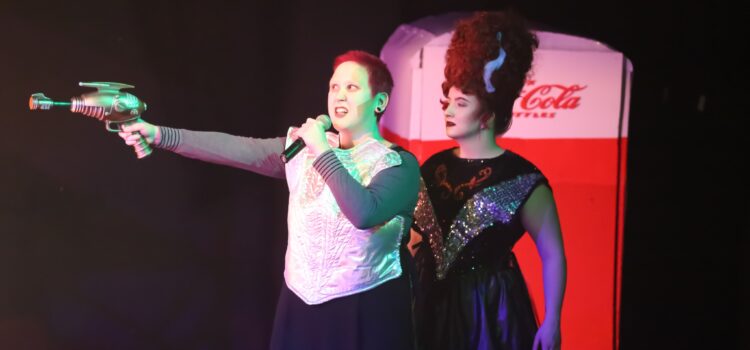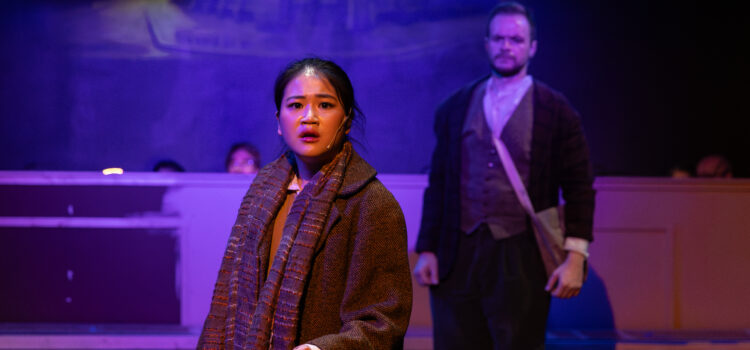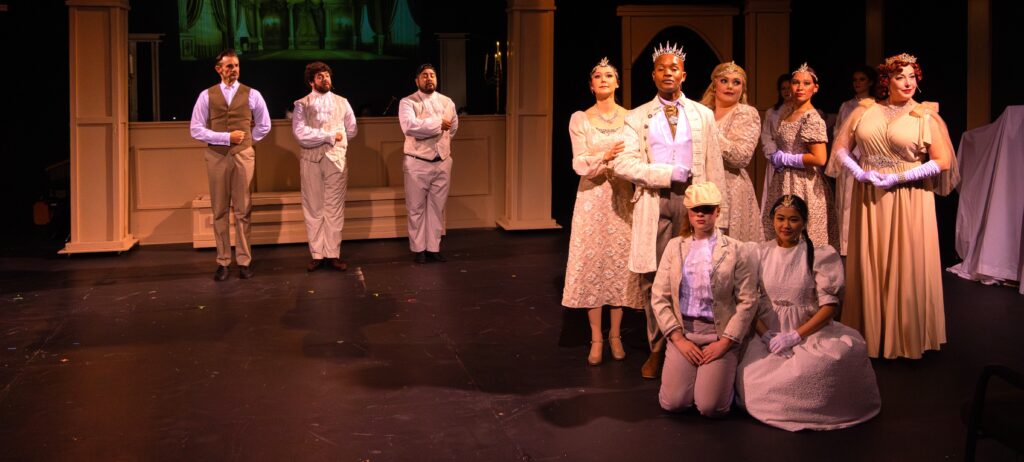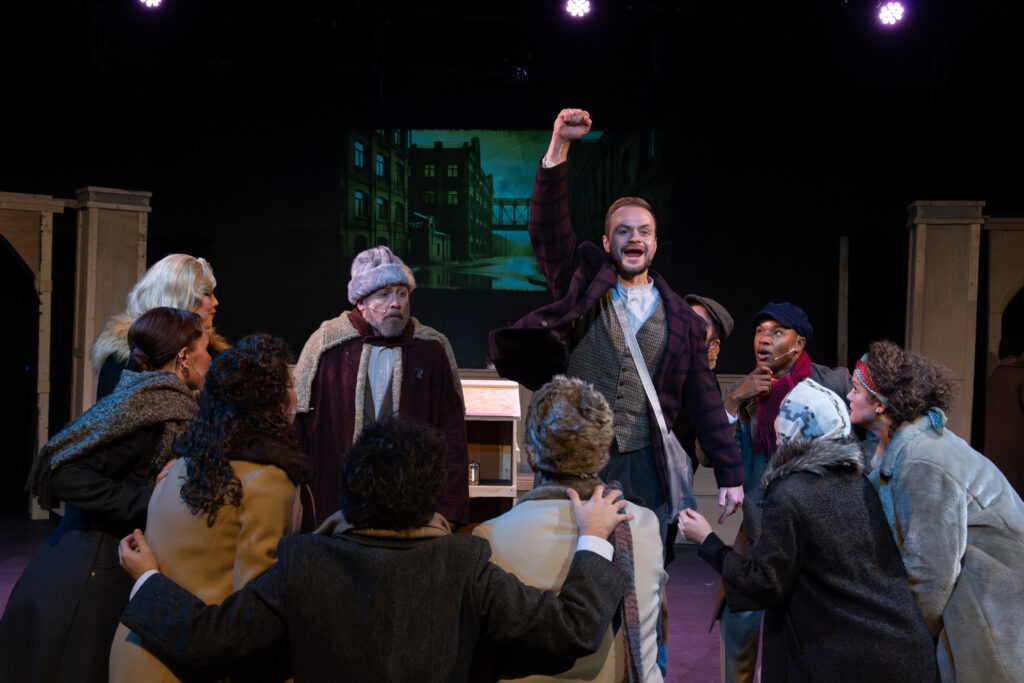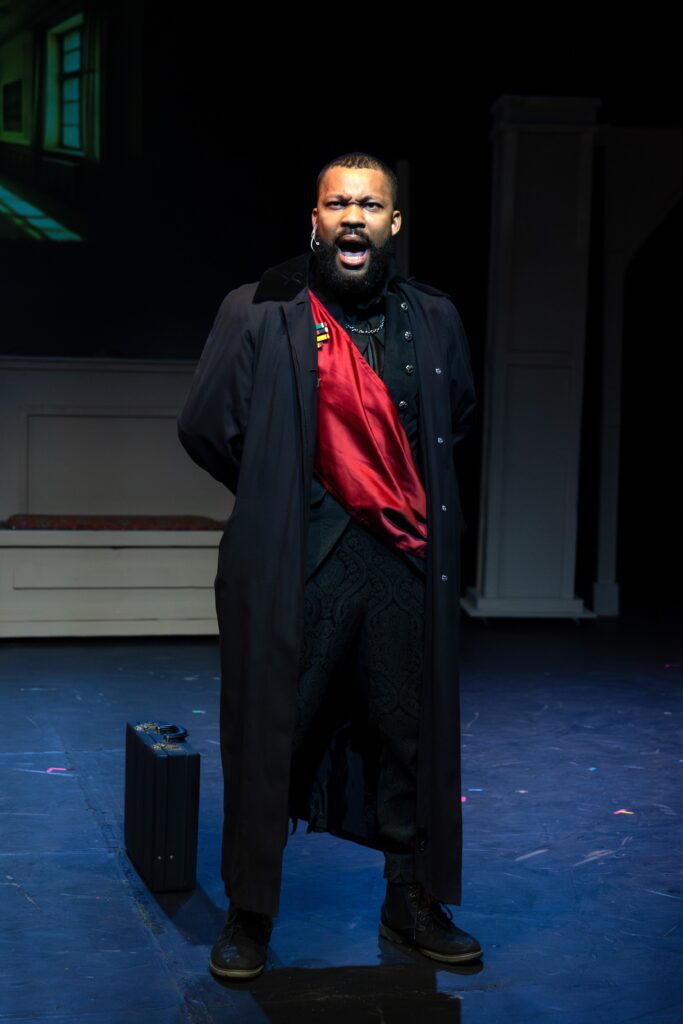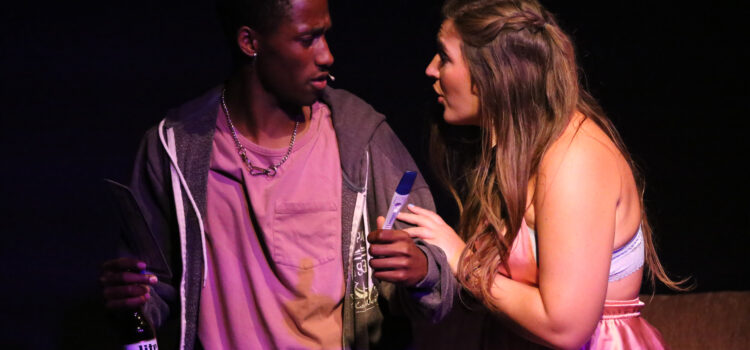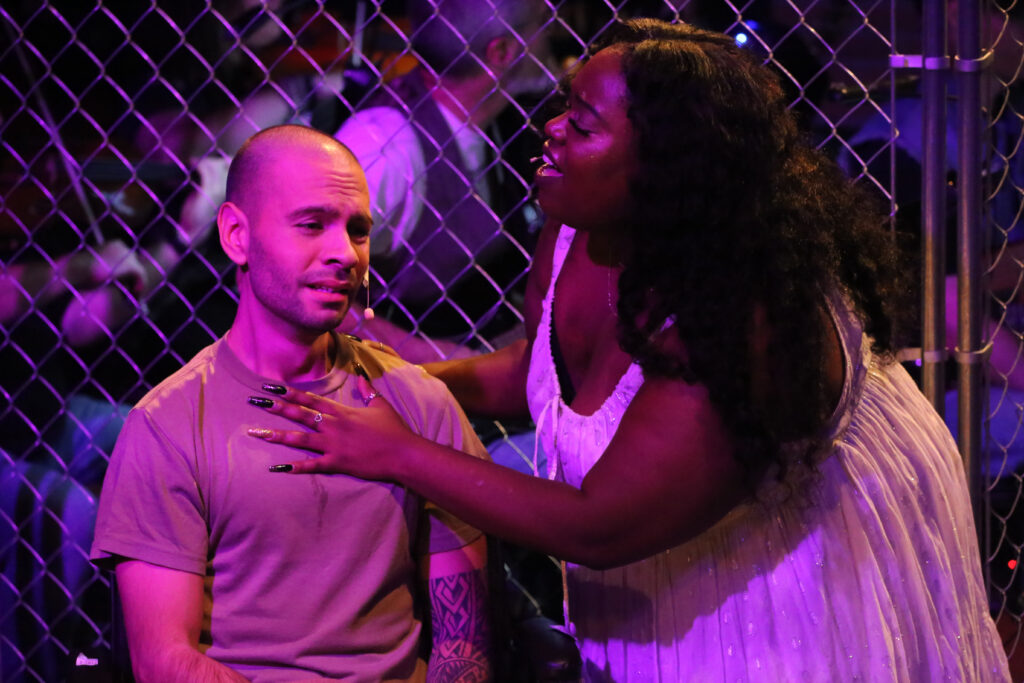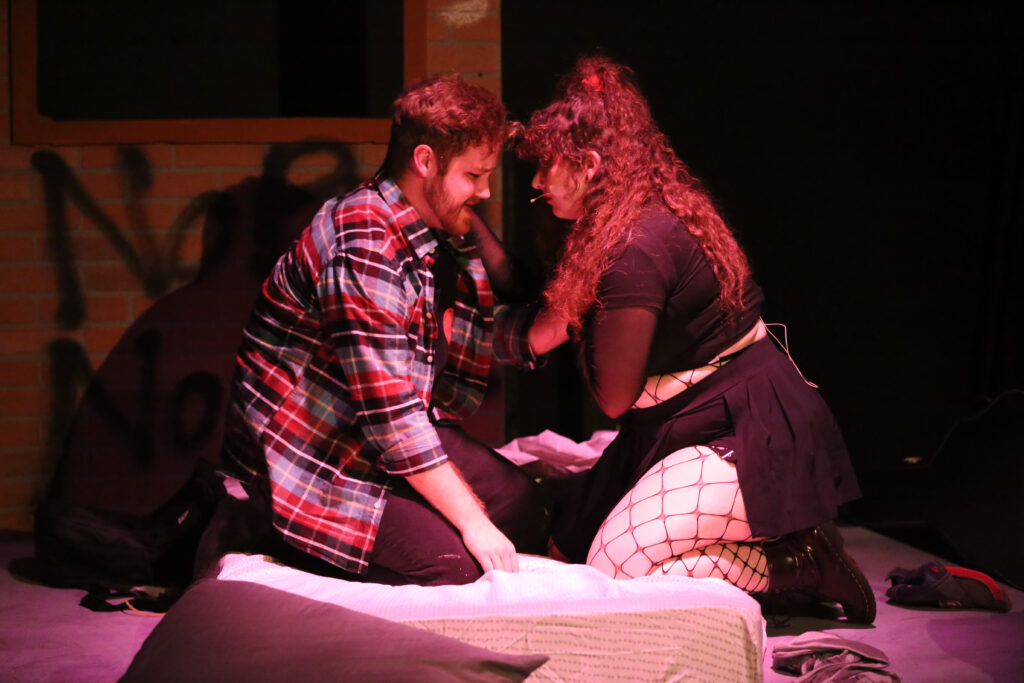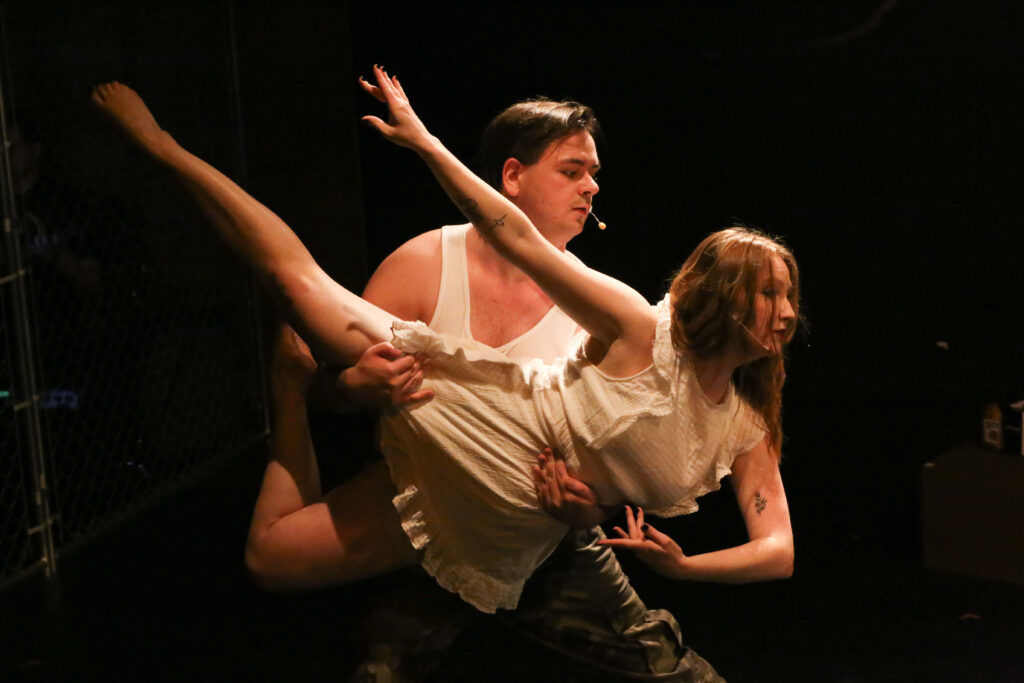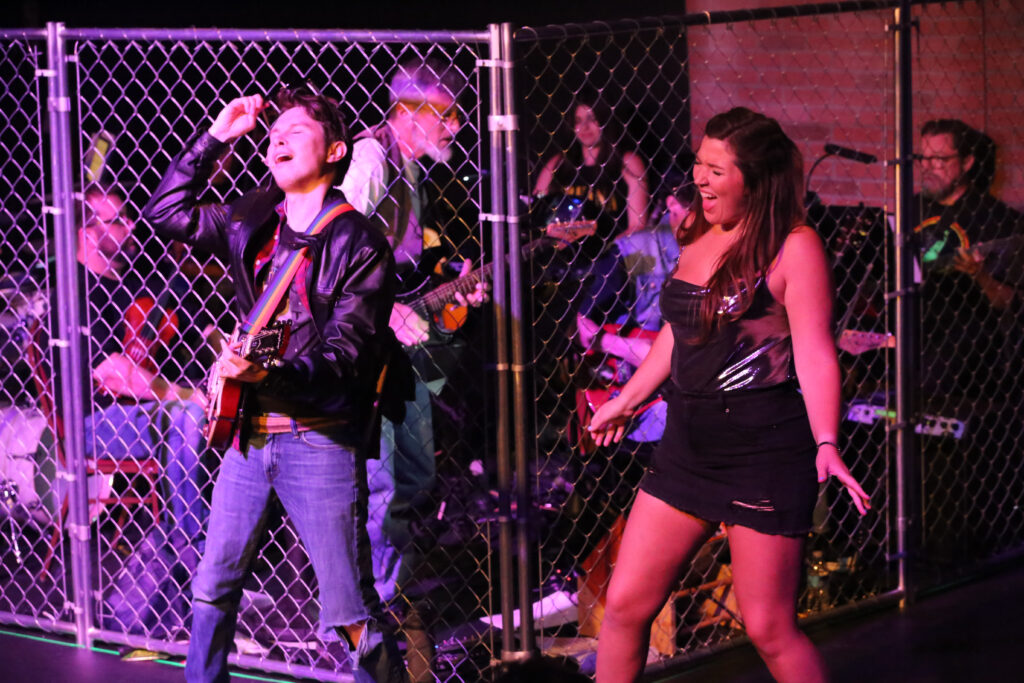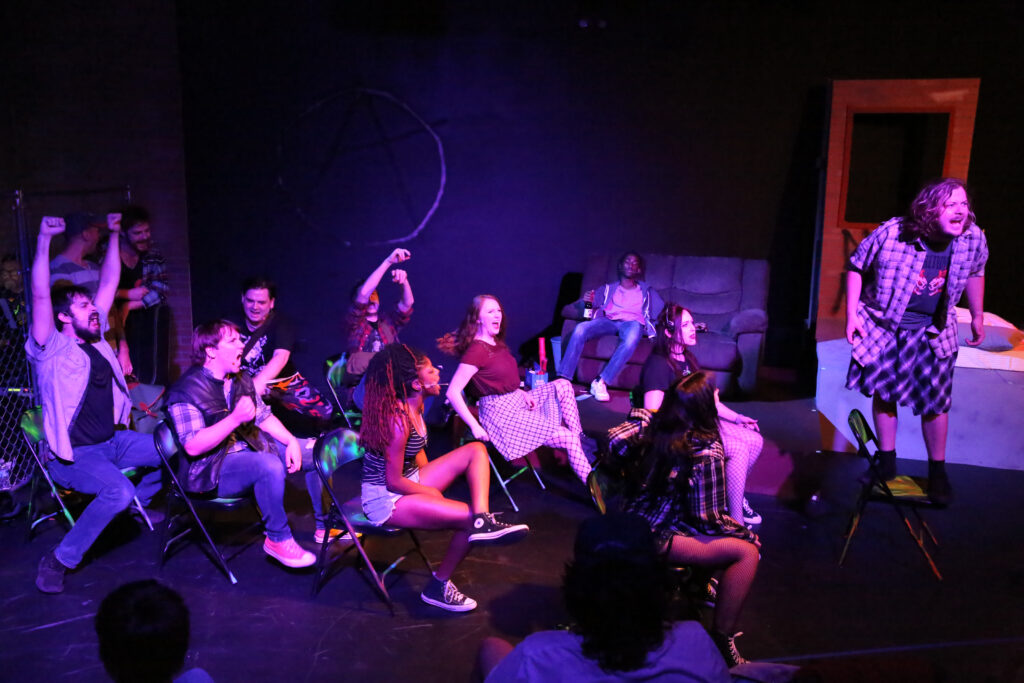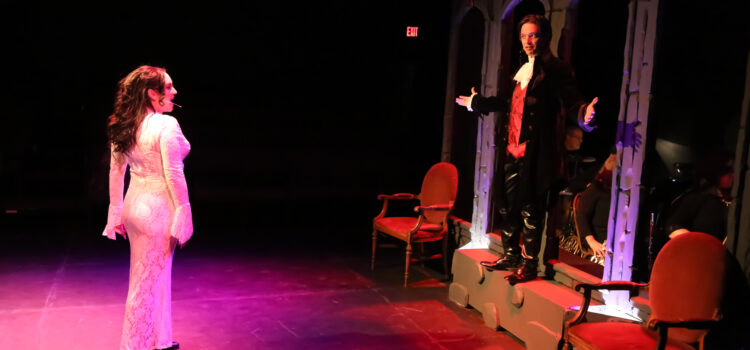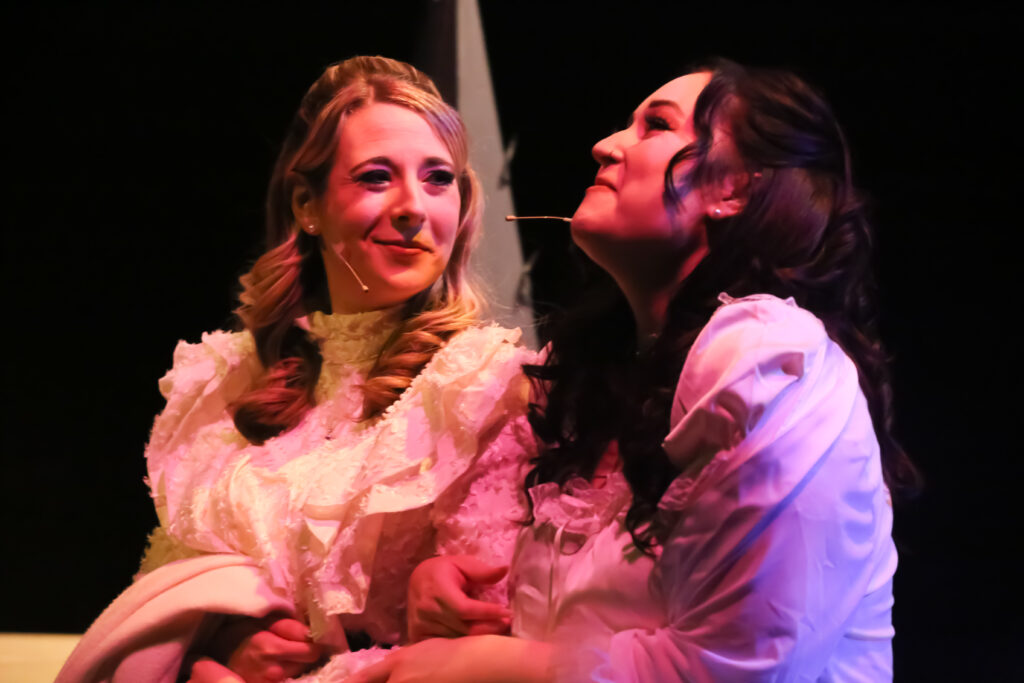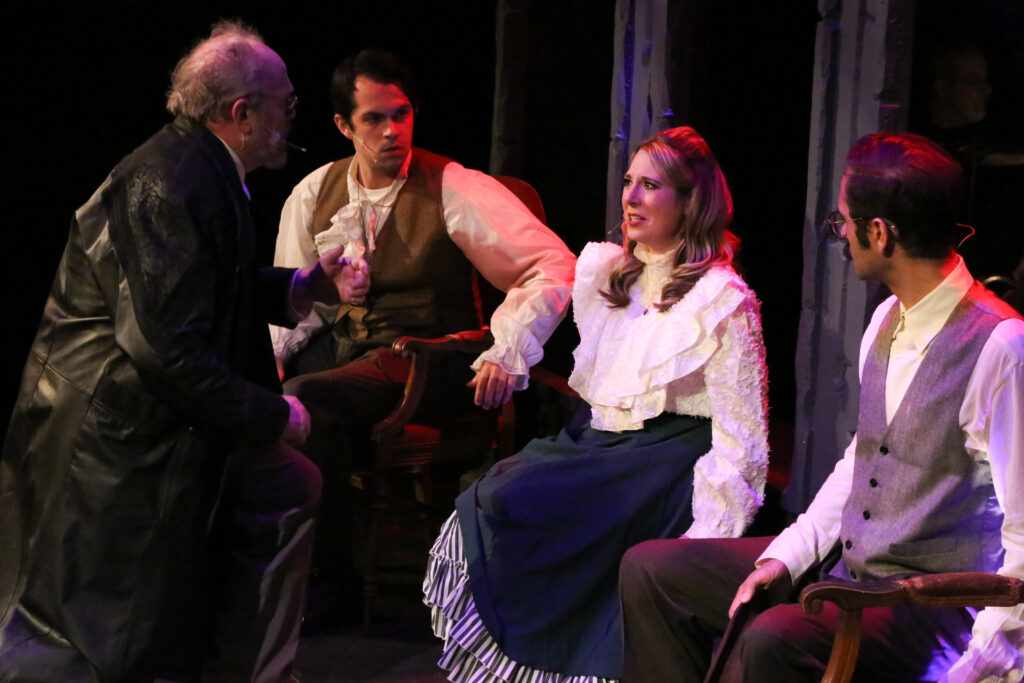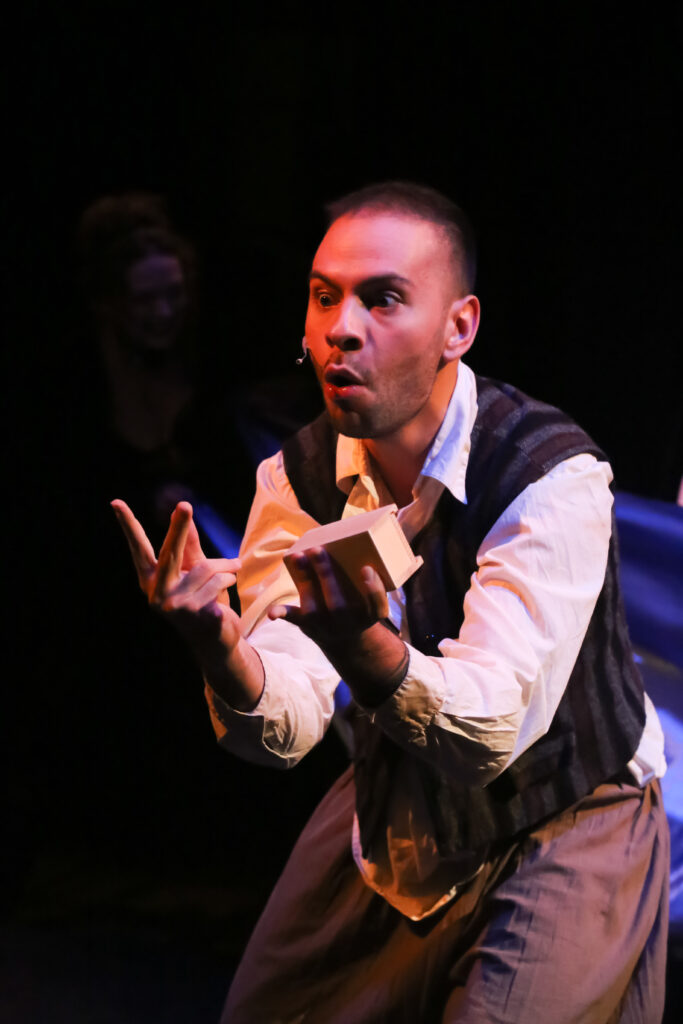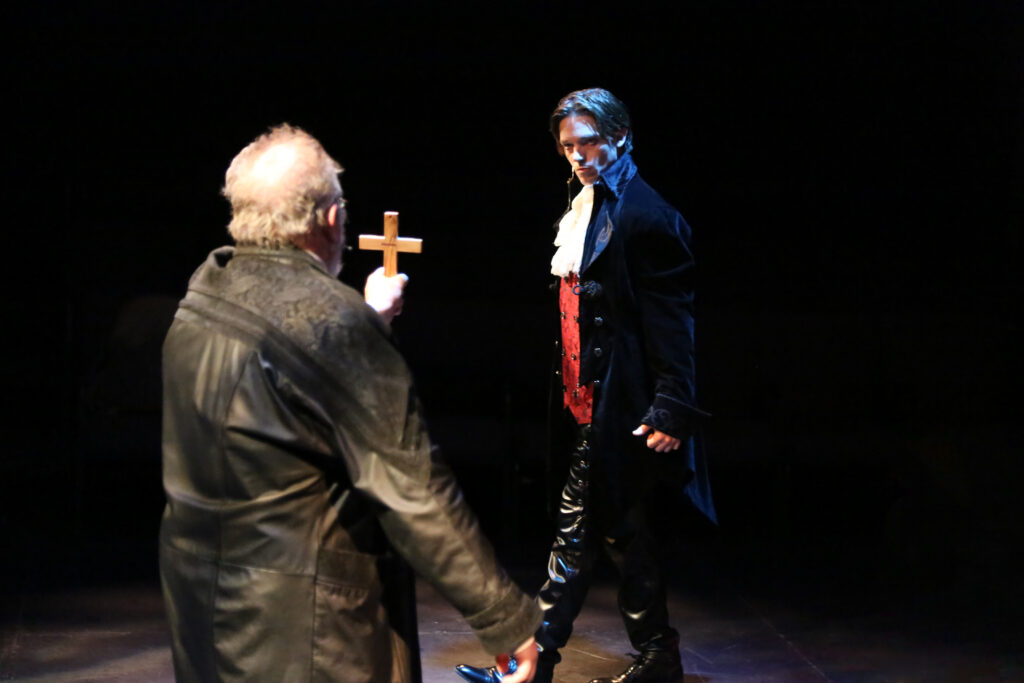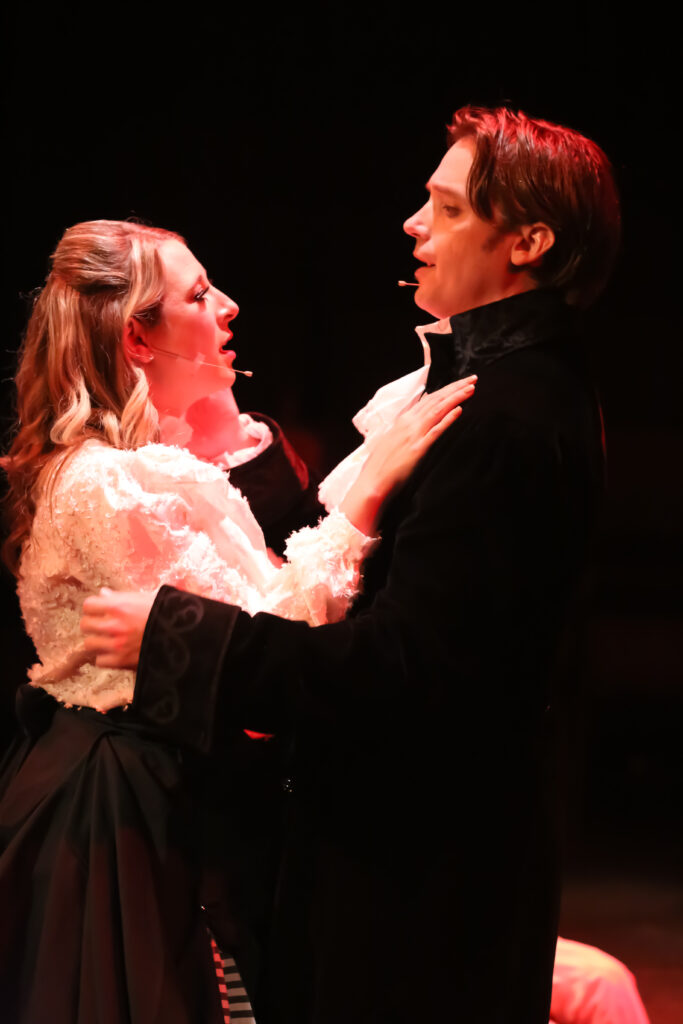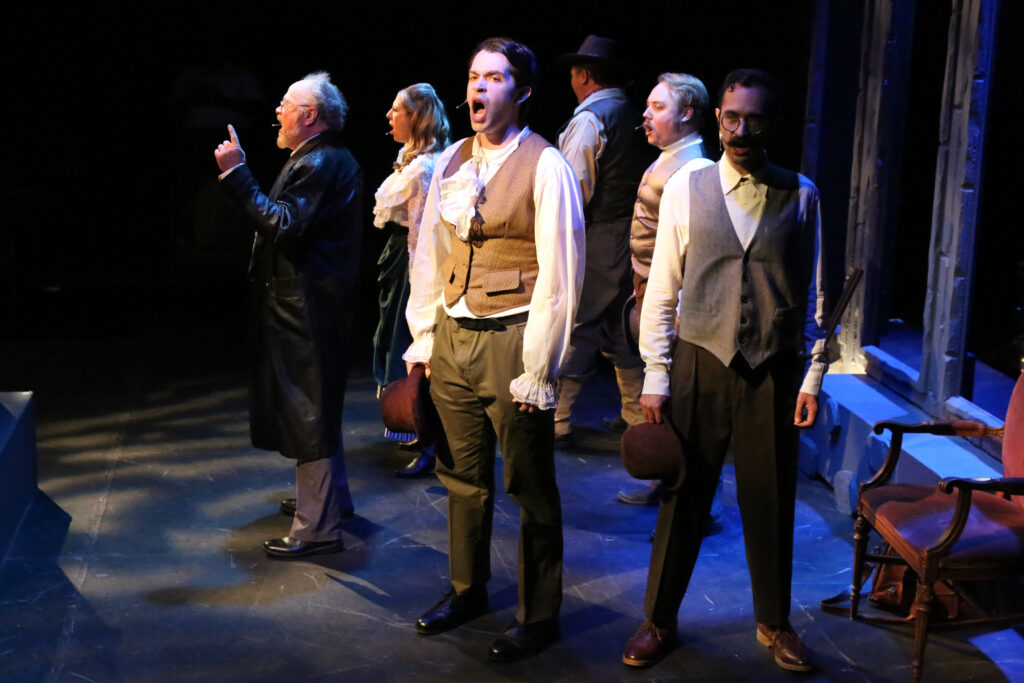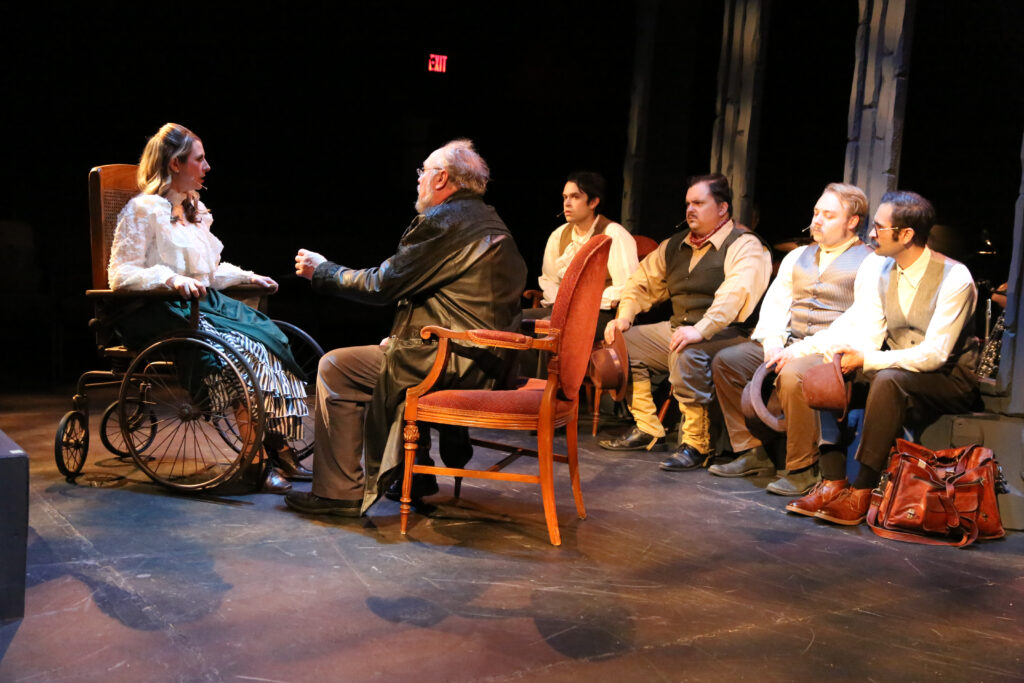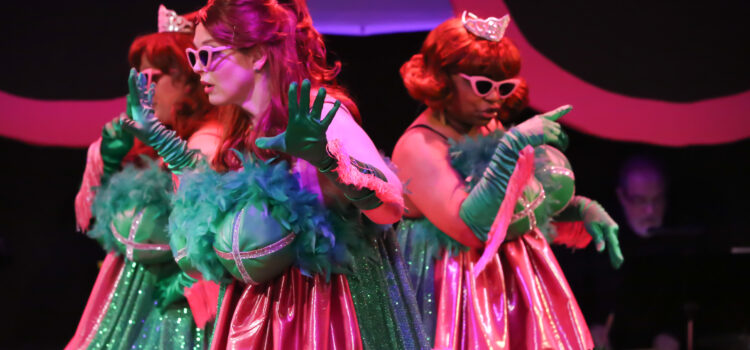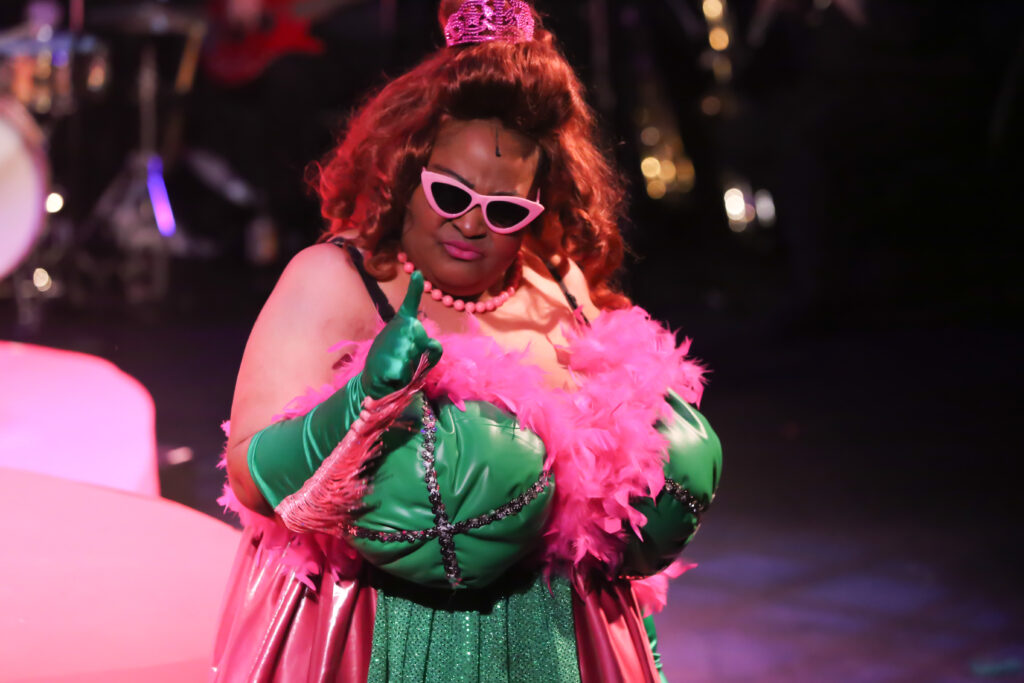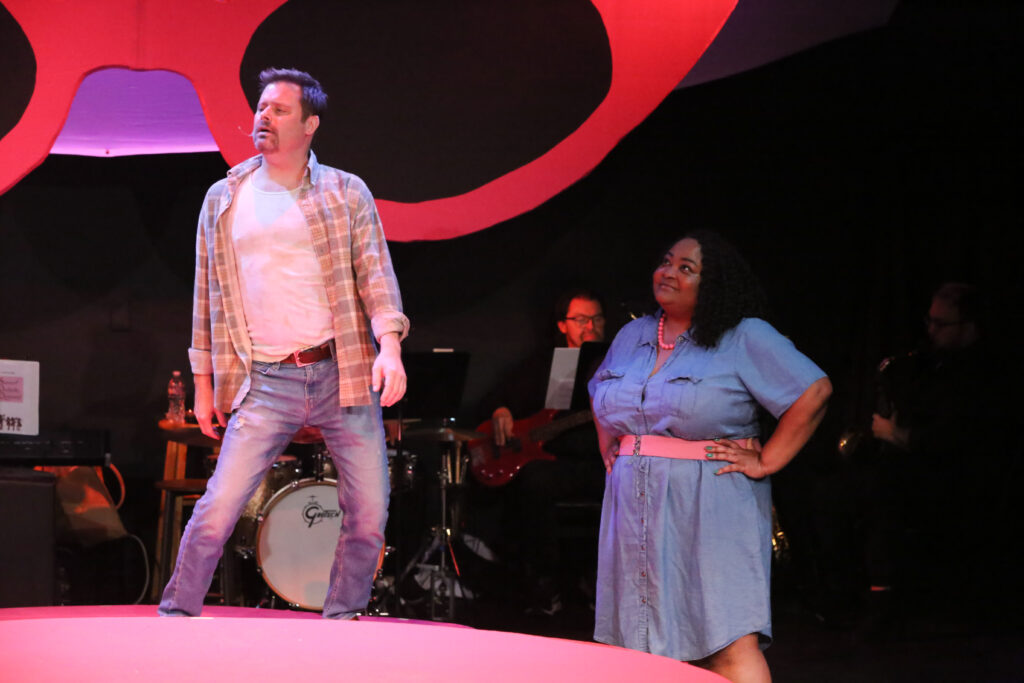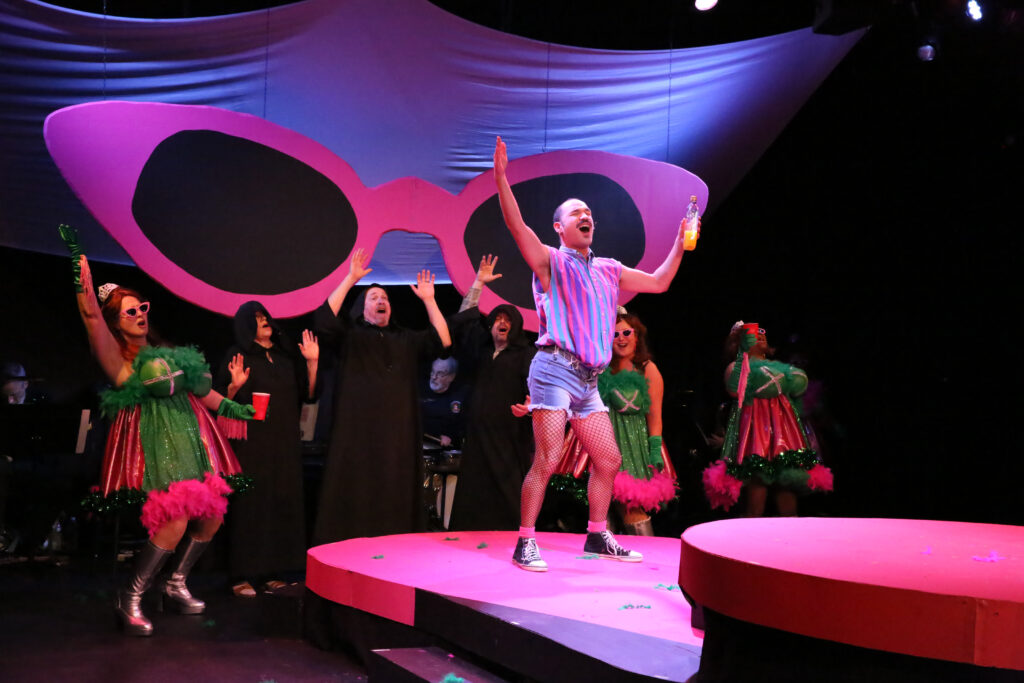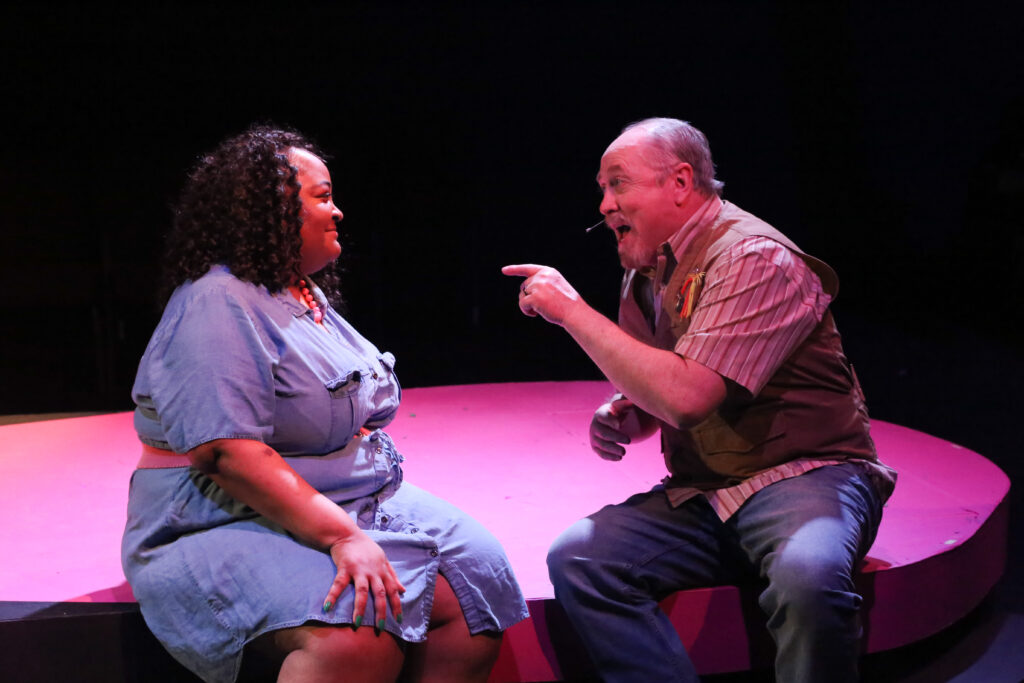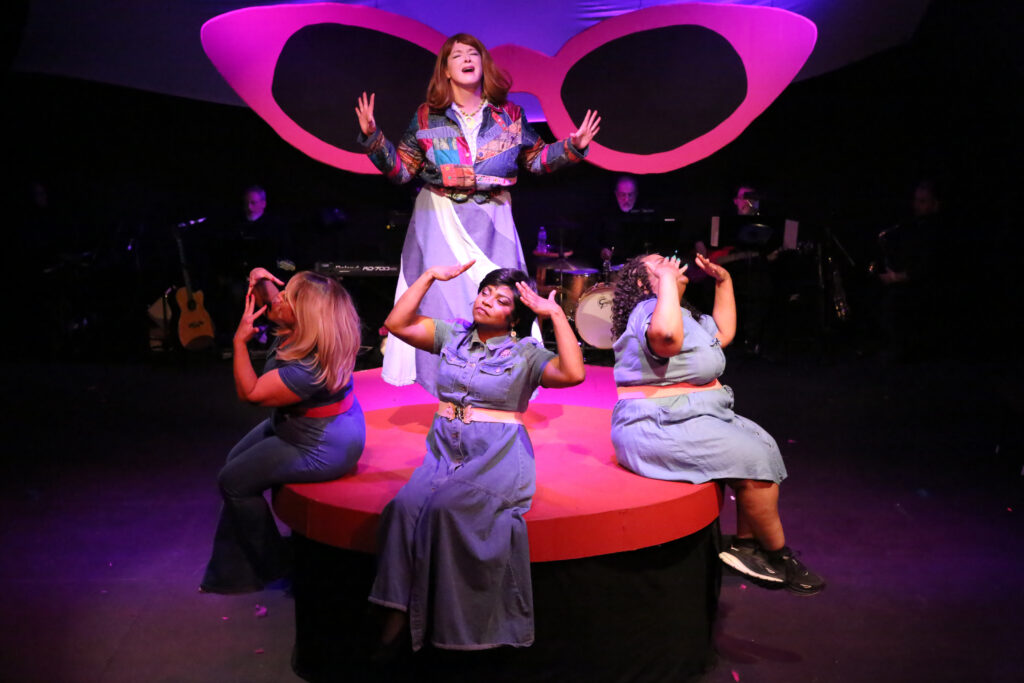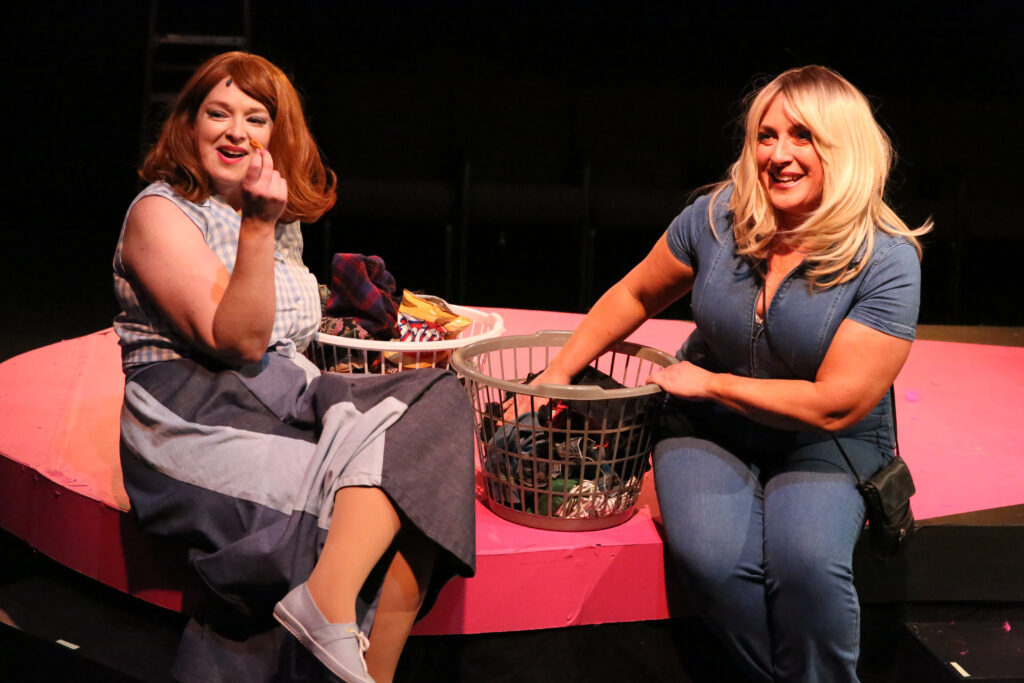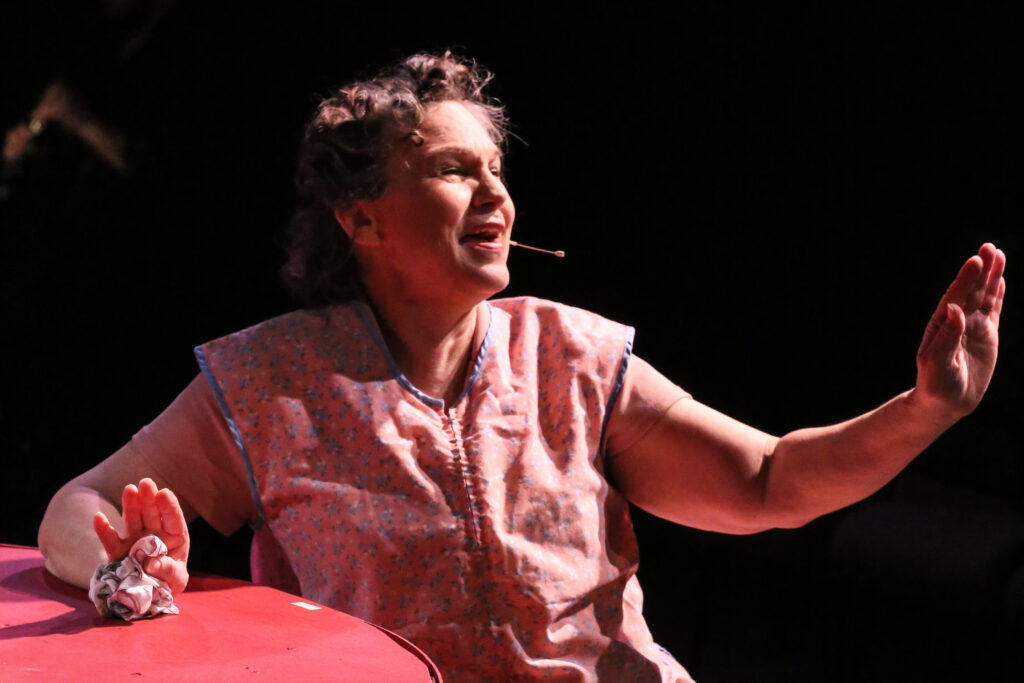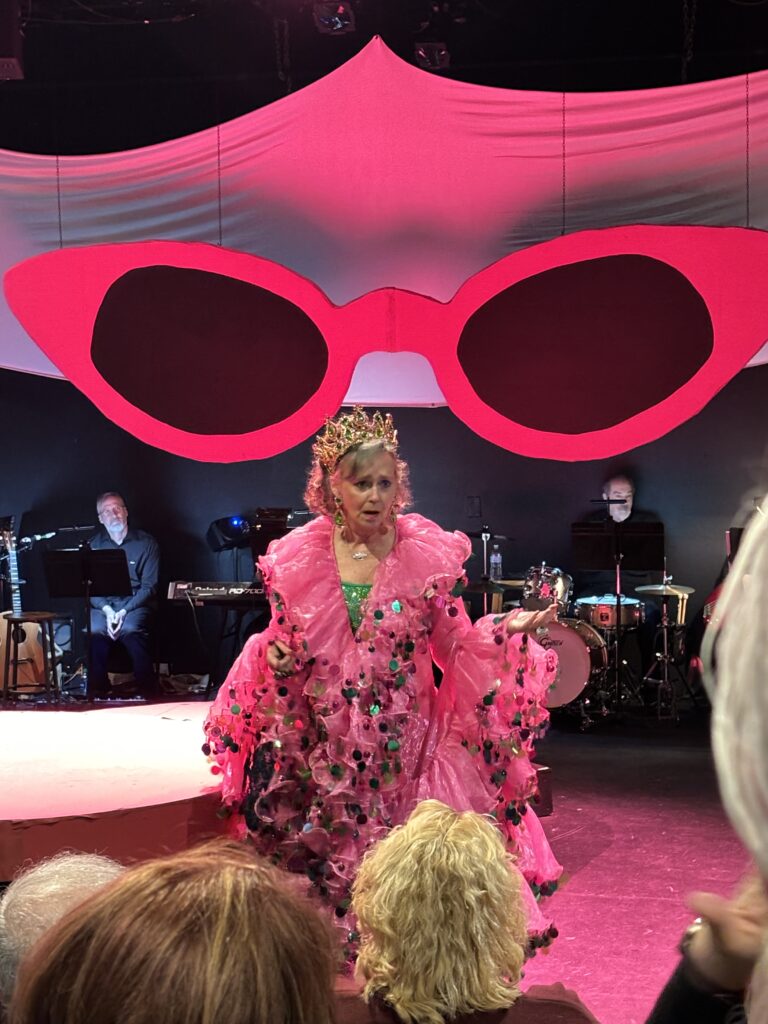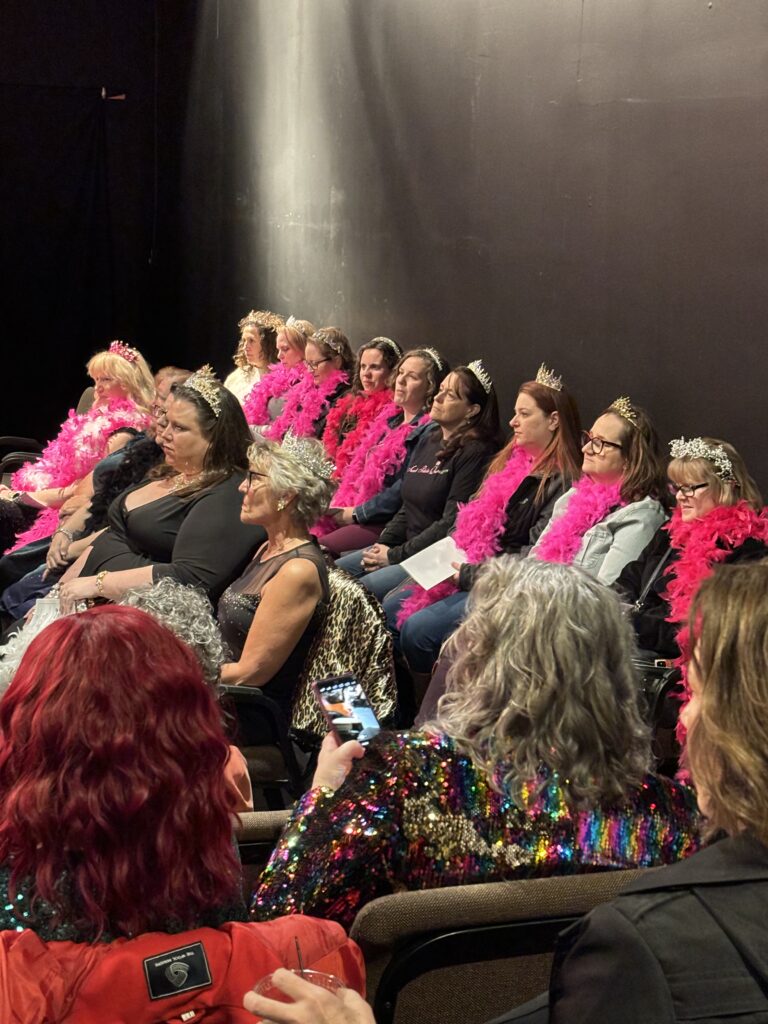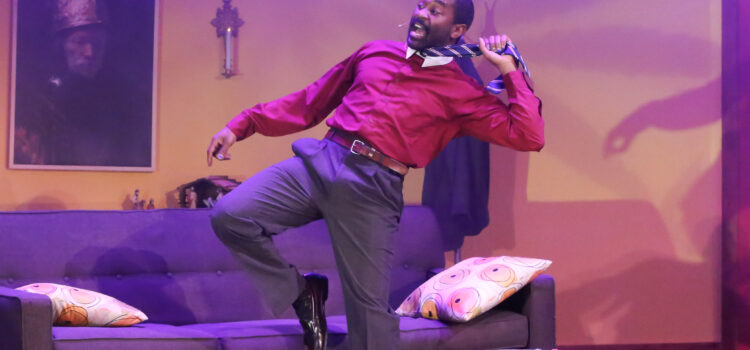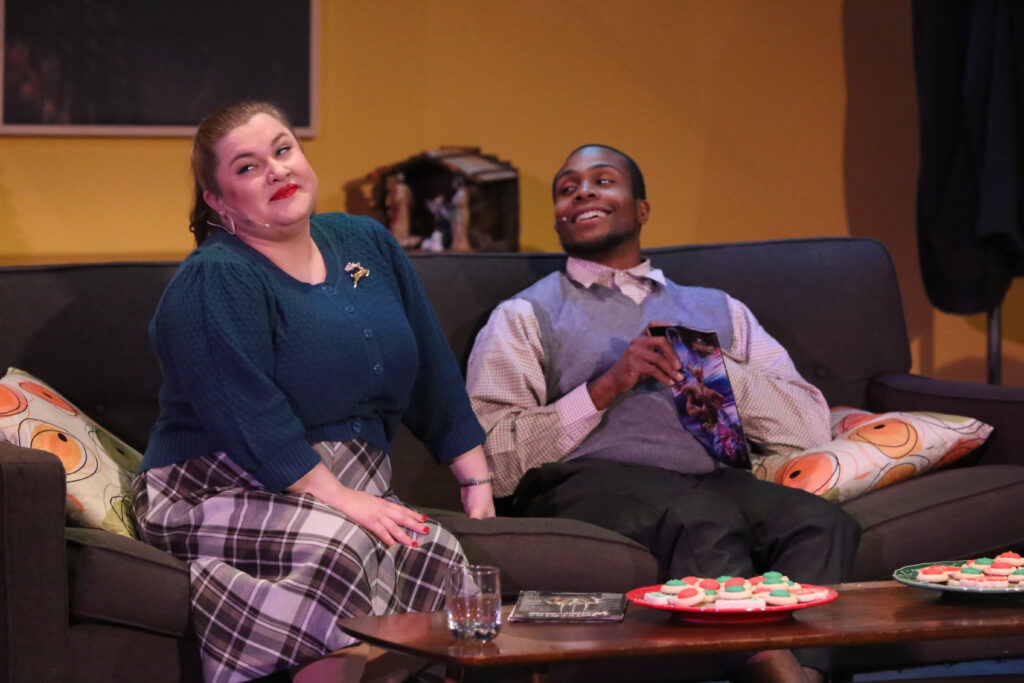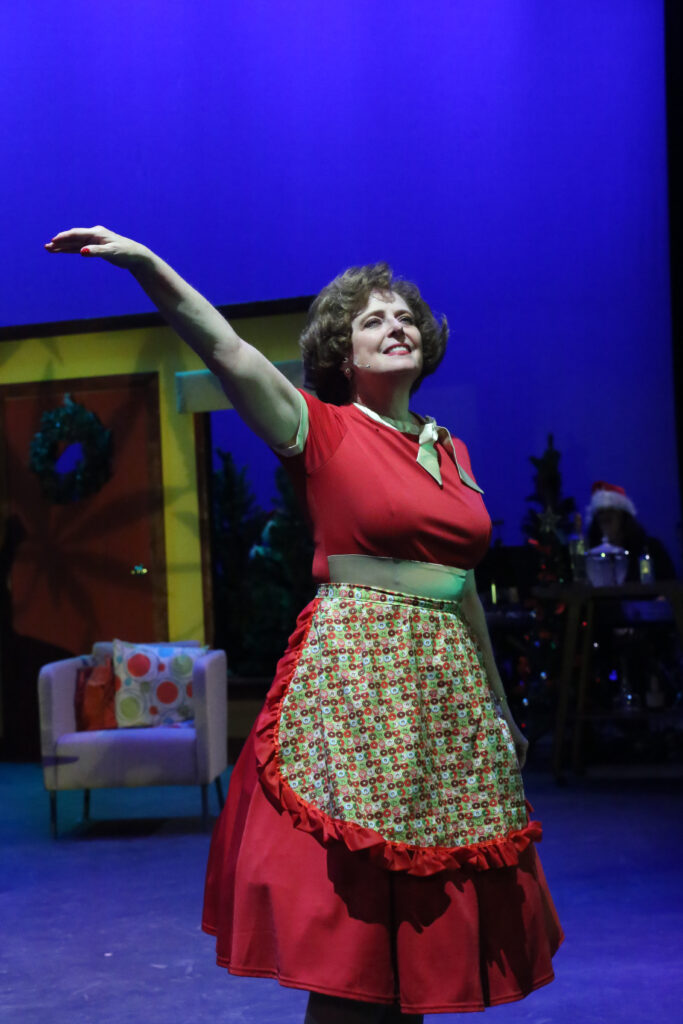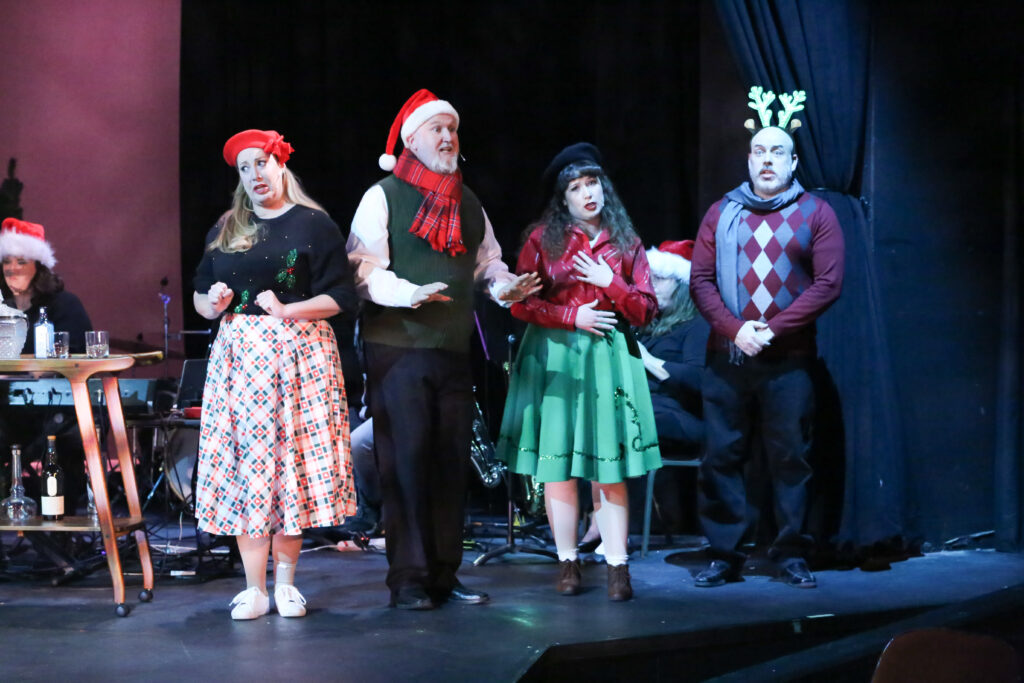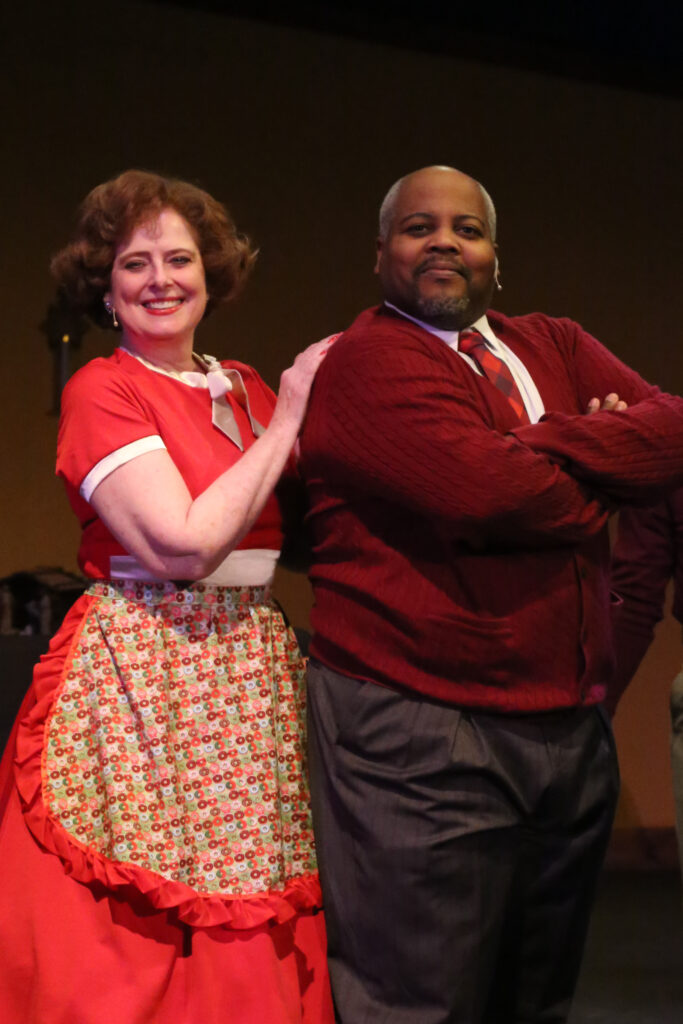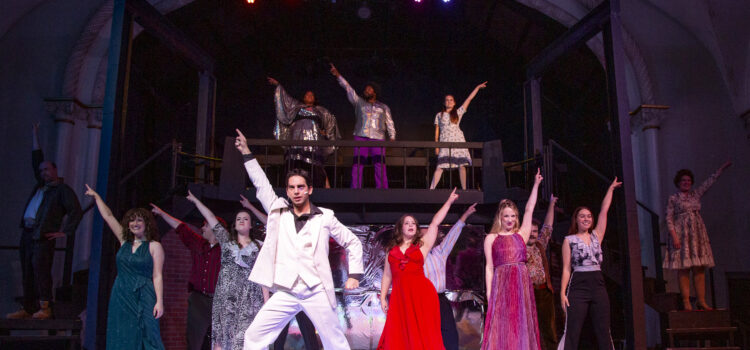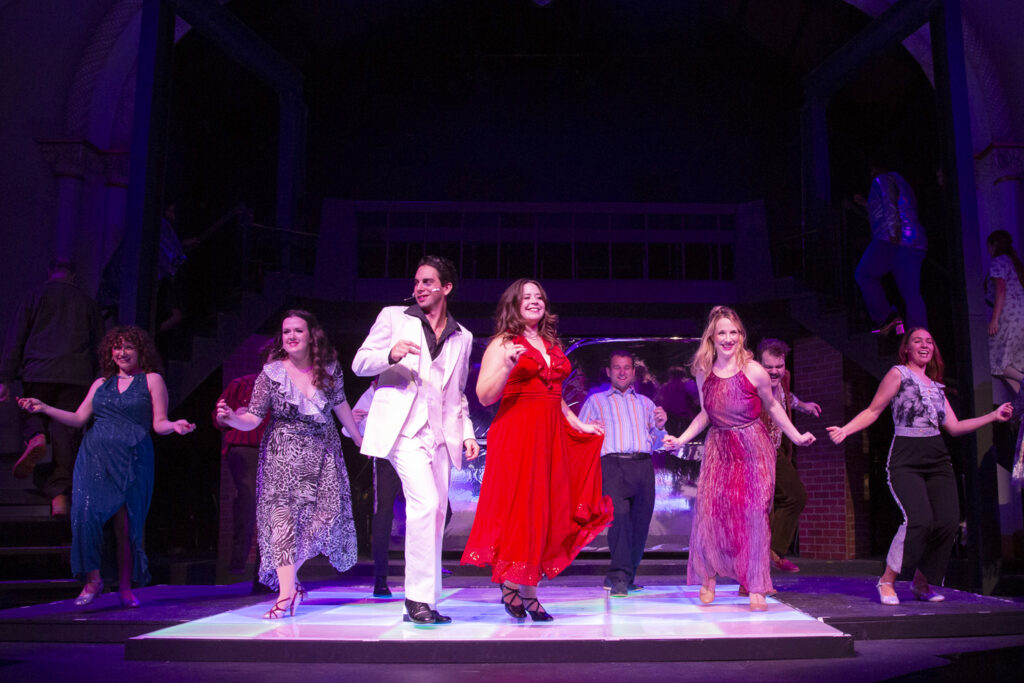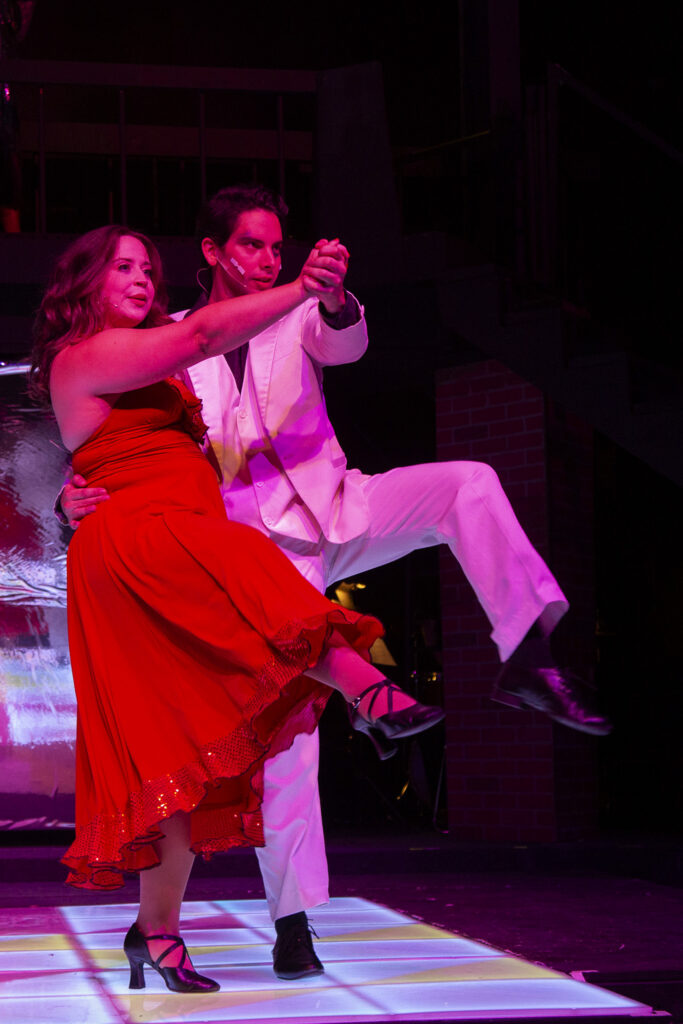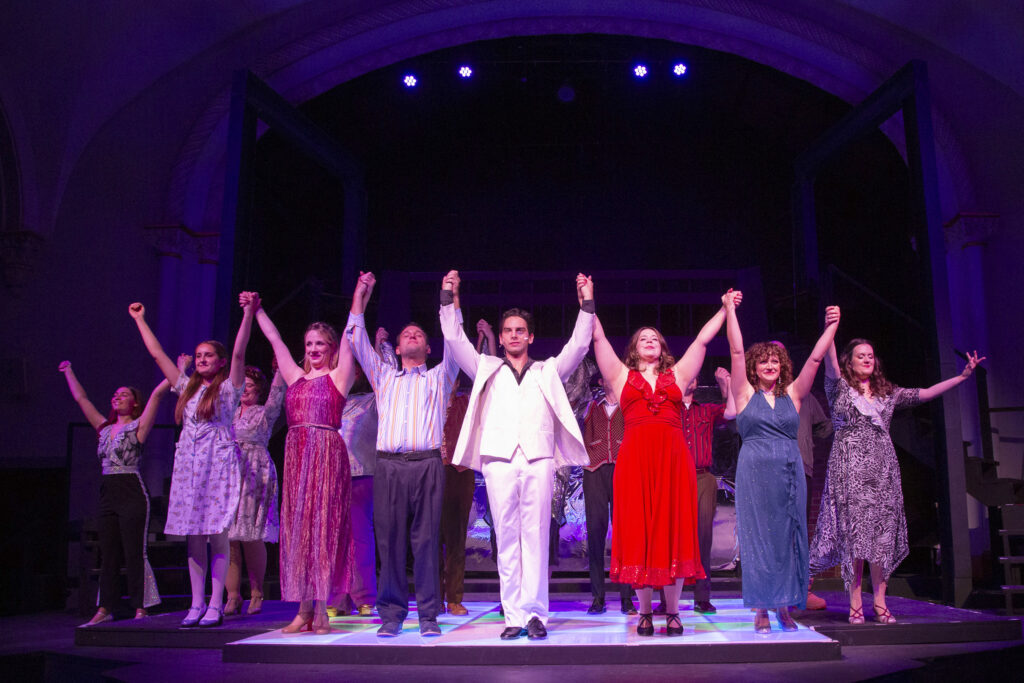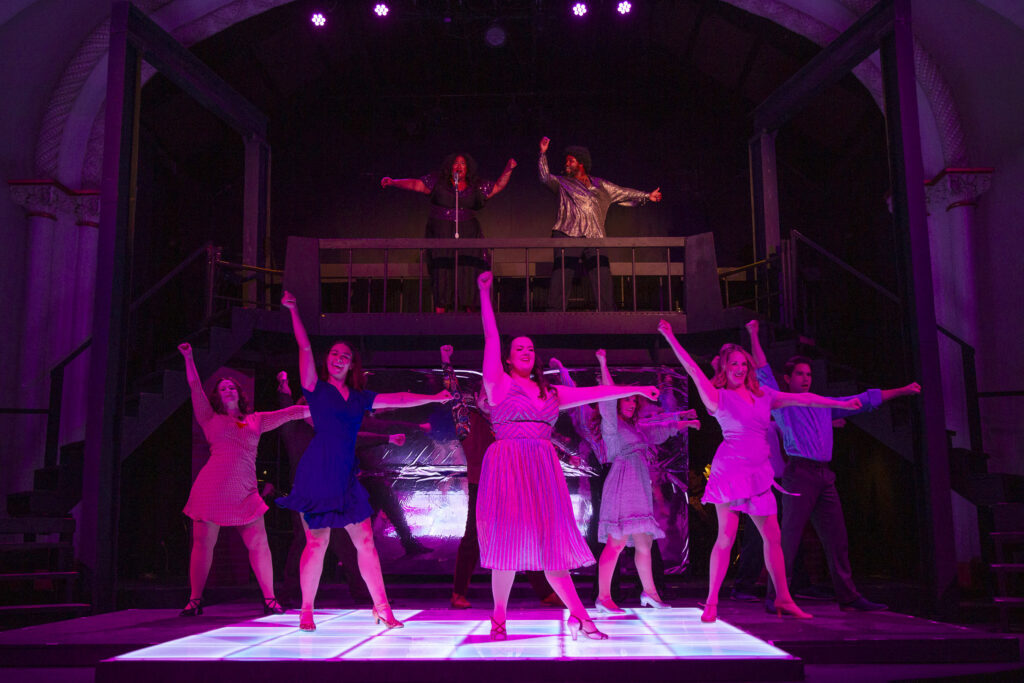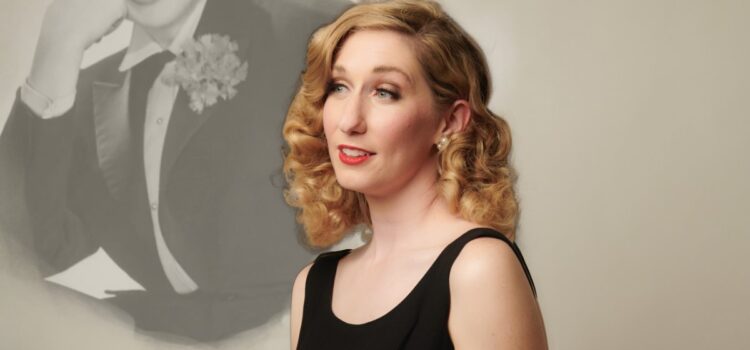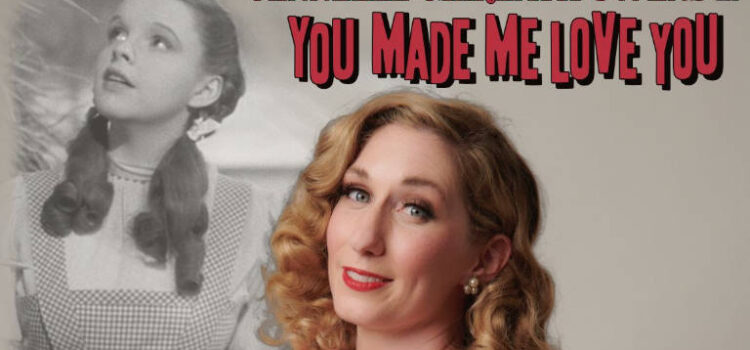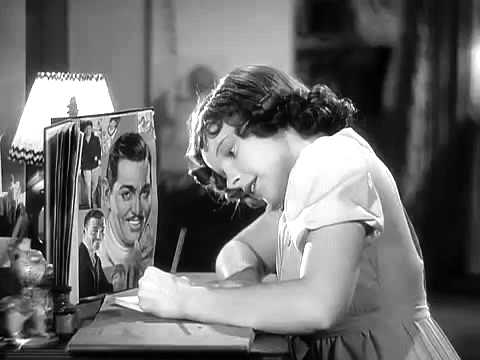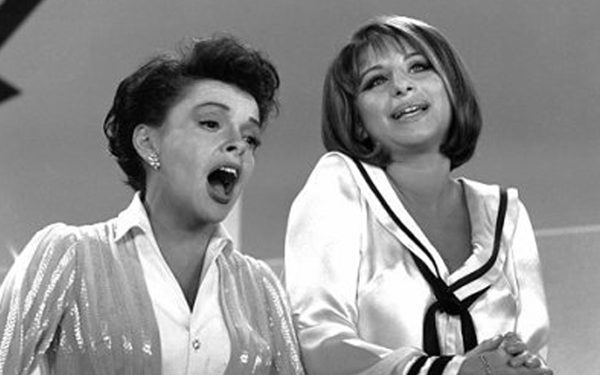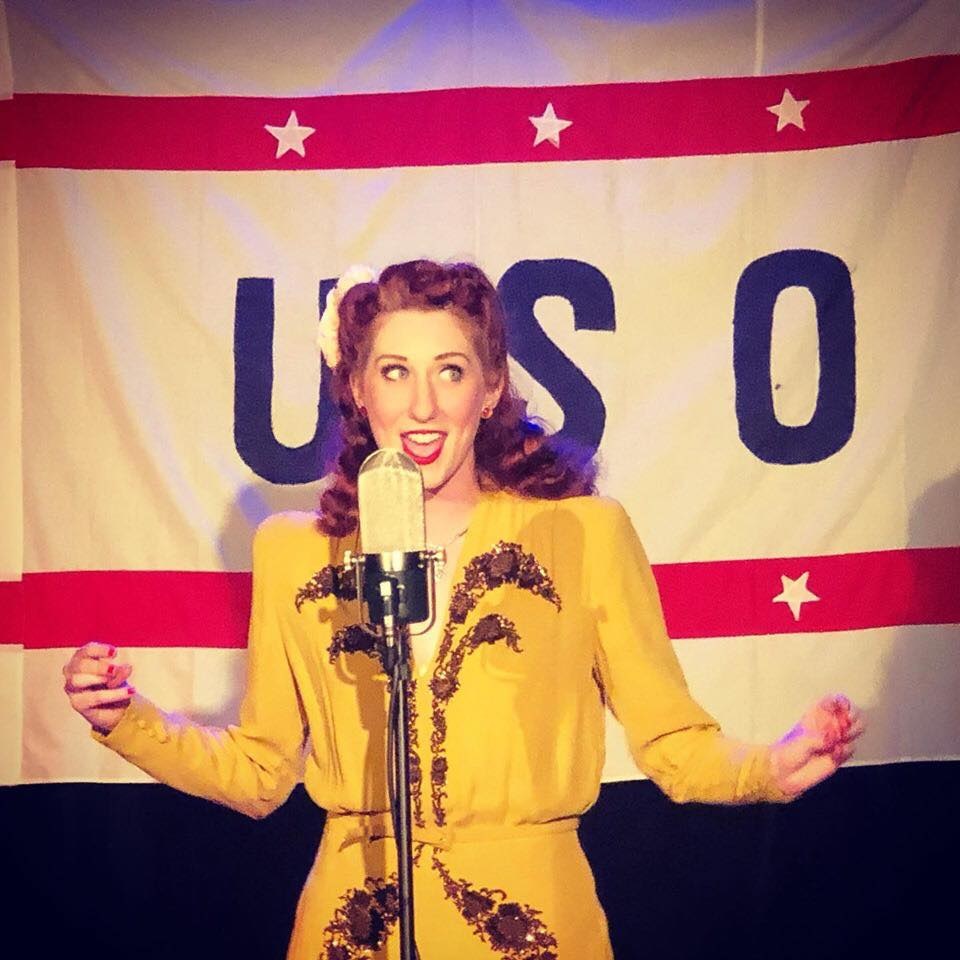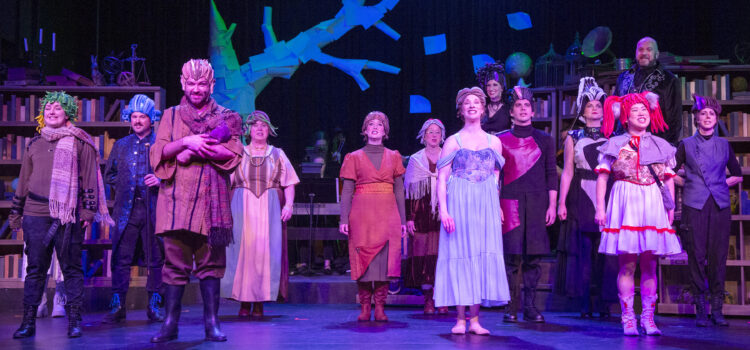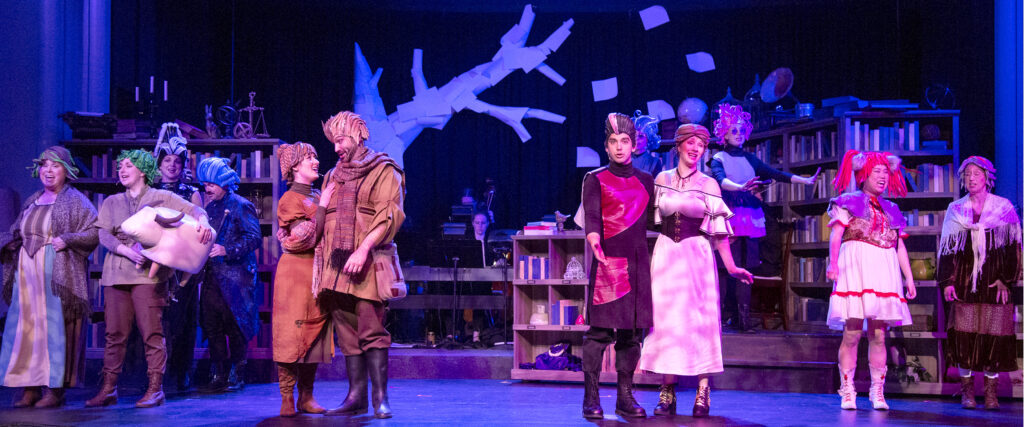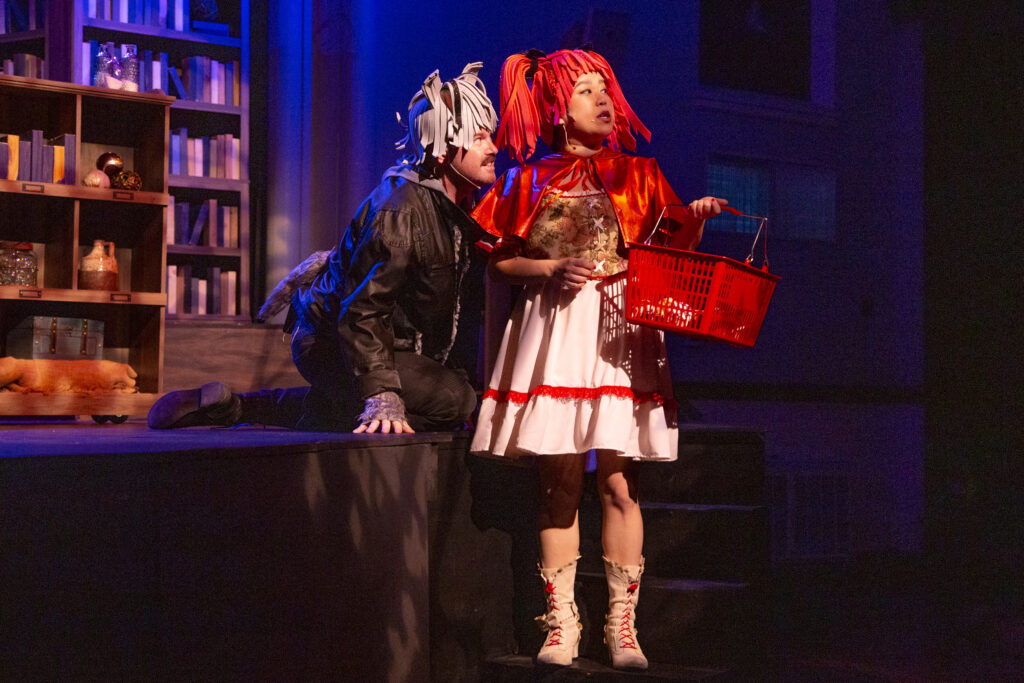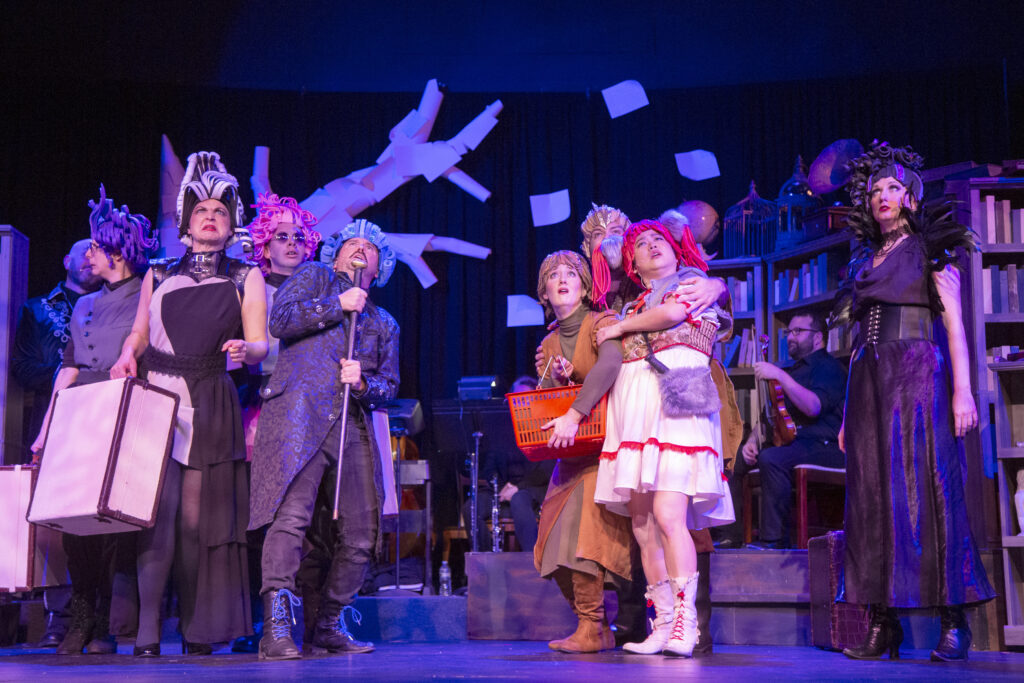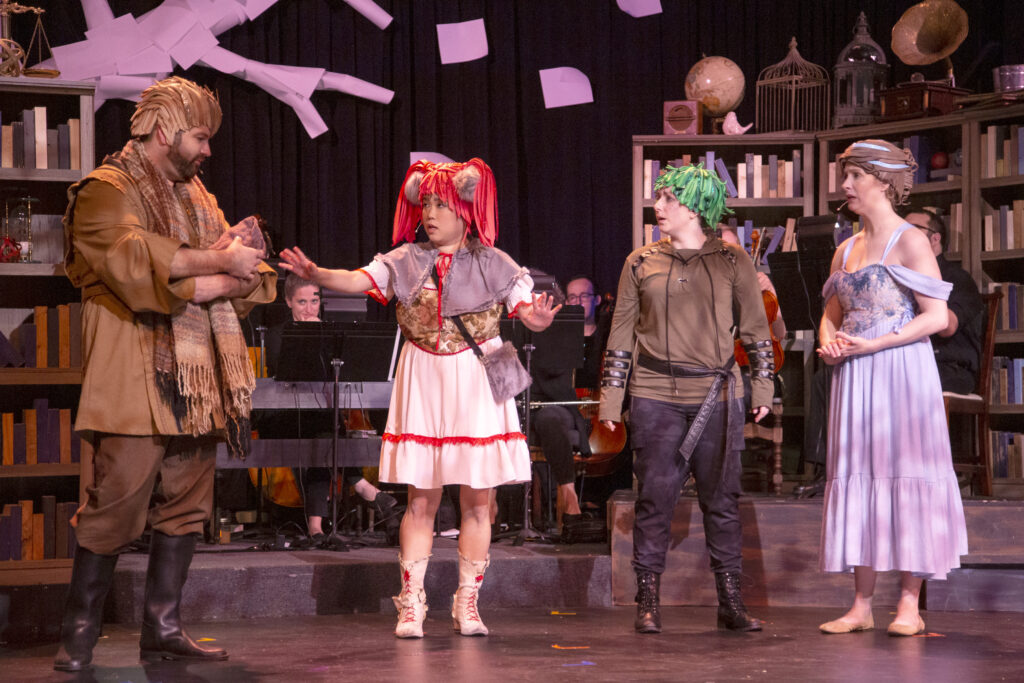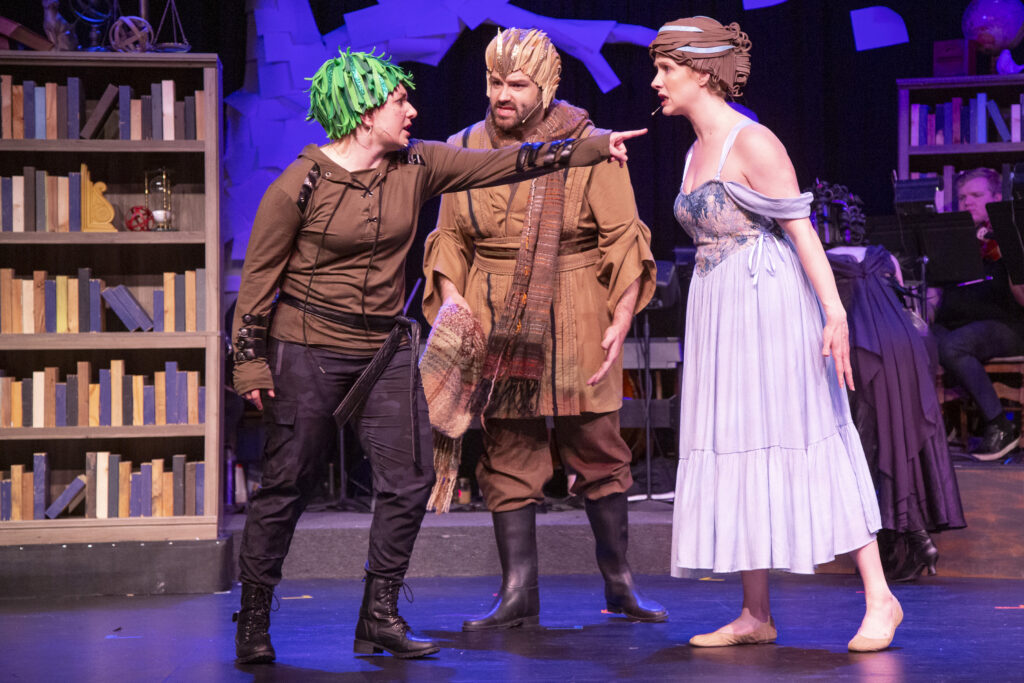By Lynn Venhaus
Madness takes its toll, yes siree, so who needs fantasy to free you? If you are yearning for a time slip, step back into another dimension and do the Time Warp again!
After all, in 2025, many of us are craving an escape, especially after a very long dreary winter and escalating chaos in the world. What better way than to join like-minded theatregoers and be entertained in a feel-good another-world way? (At least, if you can’t afford a tropical vacation).
The enduring much-revered fan-favorite musical “The Rocky Horror Show” is being produced by New Line Theatre after the company first staged the daring cult smash hit 23 years ago.
But it’s not a rewind. This time, a playful cast interprets the original live stage show, which varies slightly from the raucous cult classic 1975 movie “The Rocky Horror Picture Show,” and may provide a fresh perspective in this changing current climate (as in catch it now before Missouri legislators may outlaw it).
Fifty-two years ago, Richard O’Brien created “The Rocky Horror Show” as a satire for what was happening with the post-60s sexual revolution – that ye olde ‘sex, drugs, and rock ‘n roll’ era and repurposing the Frankenstein legend.
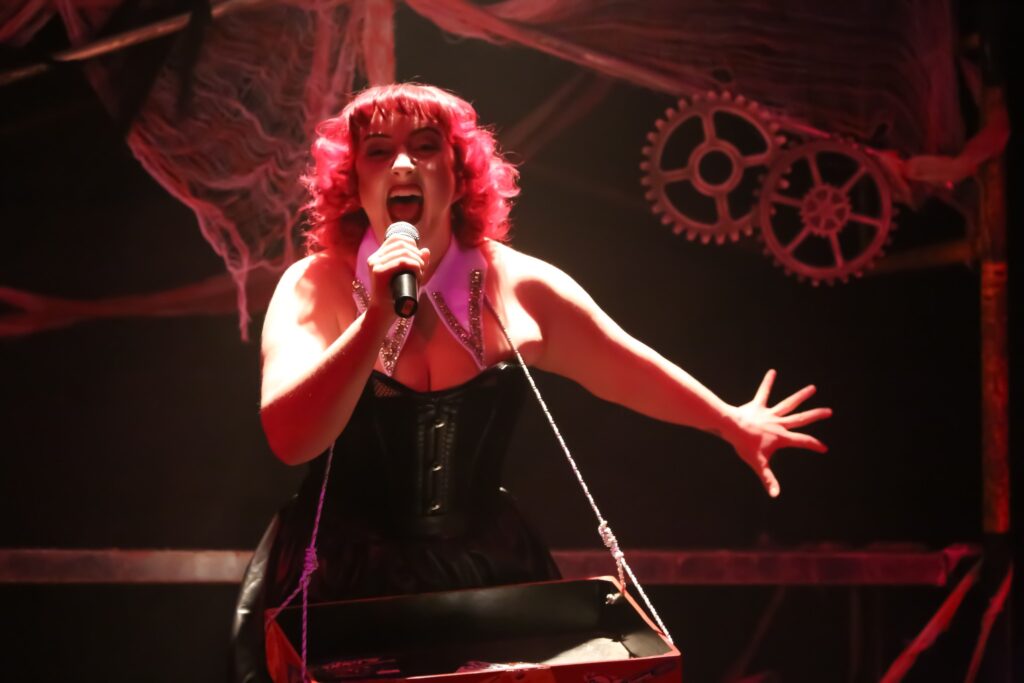
He wrote the music, lyrics and book. O’Brien’s snarky cocktail of tongue-in-cheek, wink-wink behavior, a pre-punk glitter rock concert, and plenty of sexual innuendo were mixed with a homage to old horror and sci-fi B-movies (Think Ed Wood meets The New York Dolls). It caught fire as a London stage production in 1973.
The musical’s book is keen on comedy, so the suggestive one-liners are abundant and so are the flying freak flags in Transexual Transylvania. After all, it was always meant to be tawdry and tacky.
New Line’s production attempts to re-ignite the fervor for sassy and saucy iconic characters who proudly live their life out loud (but in a spooky setting that erupts into dance parties at will).
For the uninitiated, the story follows the transgressive space explorer Dr. Frank N. Furter, his fellow aliens, his Creature, and a few hapless humans.
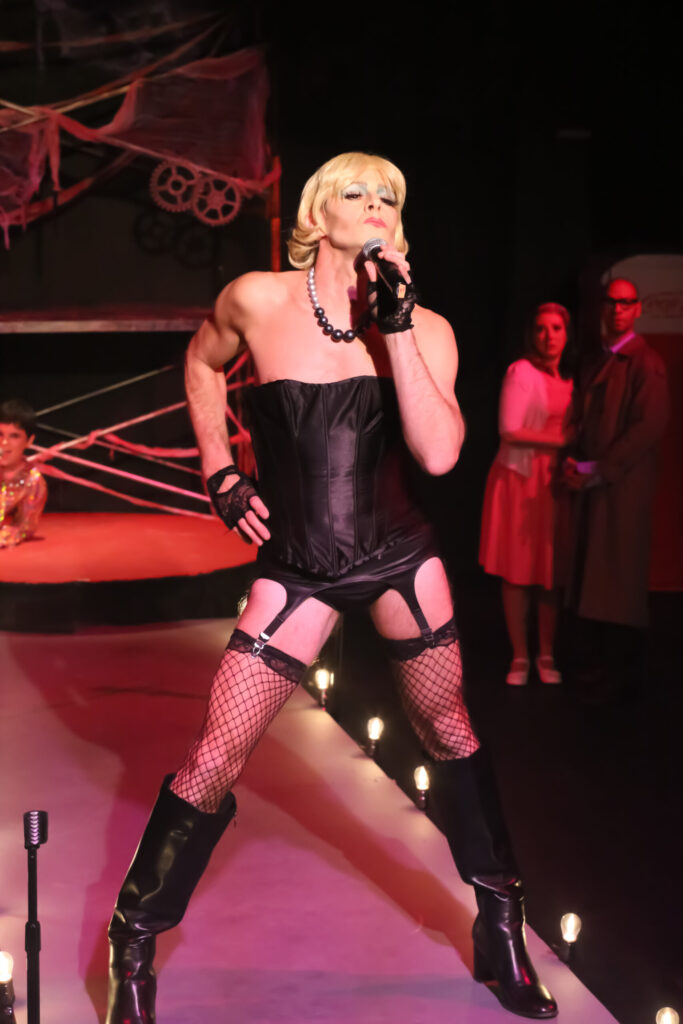
Todd Schaefer, who played Brad Majors in New Line’s 2002 endeavor, returns as the wickedly naughty, sexually ambiguous, mad scientist Dr. Frank N. Furter. He leans into the kitschy, campy vibe, confidently strutting in risqué leather and asserting that he is the master of his domain in “Sweet Transvestite.”
Schaefer, who has appeared in 14 shows with the company, grabs hold of the spotlight and delivers his audacious come-ons and comebacks with charming zest and perfect timing. In the second act, he brings the house down with the power ballad “I’m Going Home” after lamenting in “Don’t Dream It, Be It.”
Also standing out were Brittany Kohl and Rafael DaCosta, who earnestly play the lost, scared and confused newly engaged couple Janet Weiss and Brad Majors, a nubile ingenue and her nerdy preppy who are mocked for their naivete and later are energized by their sexual awakening (mostly in the dark, as told in narration).
Their strong voices blend beautifully, especially in “Super Heroes,” and while projecting their characters’ cluelessness in “Damn It, Janet” and “Over at the Frankenstein Place,” they display a sweet innocence together.
Many times, you see people over-exaggerating these roles, but Kohl and DaCosta offer endearing sincere portrayals. And then sure have fun in the second act. Brittany spryly handles “Touch-a Touch-a Touch Me” while Rafael offers a poignant “Once in a While” (cut from the movie).
Another actor having a blast from the past is Christopher Strawhun as doomed biker-greaser Eddie in his raucous solo “Whatever Happened to Saturday Night?” and in a dual role, playing serious expert Dr. Scott, who sings the peppy “Eddie’s Teddy.”
A blonde Zachary Thompson is a bold and brave boy-toy using his physicality as the freshly minted lab Creature, wearing only a skimpy gold lame G-string, and running all over the stage. He delivers a brisk “The Sword of Damocles.” In the second act, I was worried about his very hard fall landing, for he was giving 100% in his characterization.
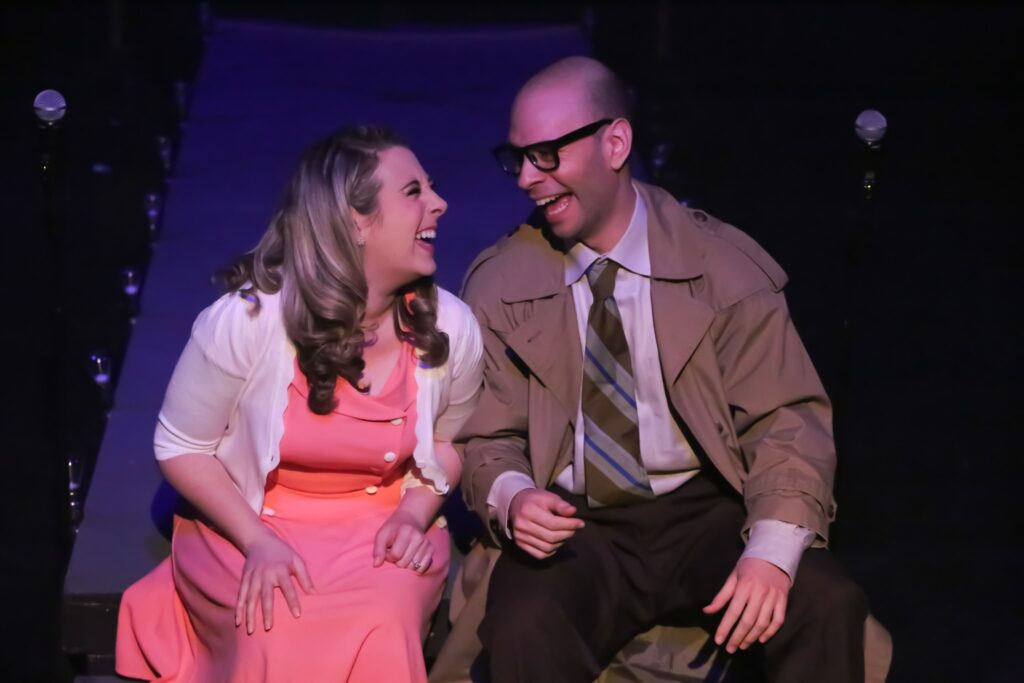
Katie Orr as Magenta and Tori Shea Cole as Columbia go full glam rock. Orr sets the mysterious mood with the opening “Science Fiction/Double Feature.” She joins her brother Riff-Raff and Columbia on the frisky “The Time Warp.”
I’ve seen the stage show where they have added ensemble characters, called “The Phantoms,” to provide more singers and dancers for the group numbers. But co-directors Scott Miller and Chris Moore have kept the original 9-person ensemble intact.
The butler/handyman Riff-Raff, who is loyal to but also resentful of Frank, usually has a sinister quality. Sporting an androgynous look, Bee Mercer’s interpretation varies from the typical characterization, and while sometimes menacing, acts less creepy and more bizarre.
In another departure, she didn’t develop a strange alien-like voice but uses one like the strange butler Lurch in “The Addams Family.” But everyone presents their own interpretation, as actors tend to do, and not be carbon copies of past performers.
The narrator is crisply played, in authoritative, somber fashion, by Chelsie Johnston, a multi-hyphenate who also choreographed and assisted directing the show.
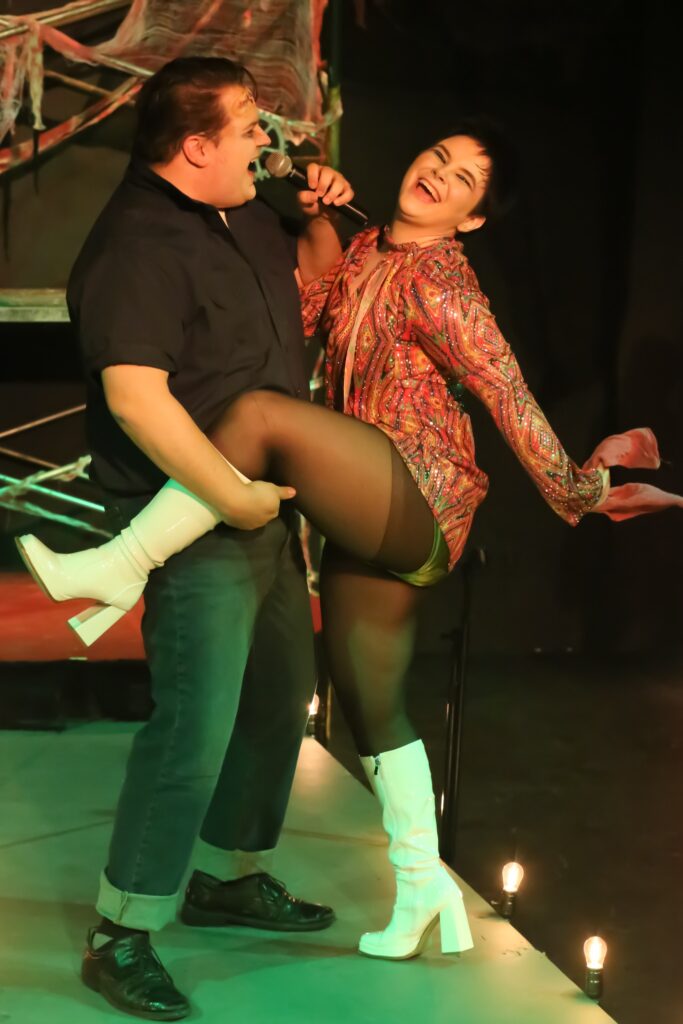
Making sure the musical numbers keep a lively beat is music director Randon Lane. He superbly conducted a robust 5-man band – John Gerdes on bass, Adam Rugo on guitar, Brandon Thompson on saxophone, Clancy Newell on drums and Jason Eschhofen on second keyboard, while he is pounding away with the driving verve of Jerry Lee Lewis. I enjoyed the sax addition.
It helps that the sound design by Ryan Day is flawless, and use of the hand-held microphones stationed on stands lining the runway was a terrific idea. A new lighting designer, Jack Kalan, had to deal with a multitude of cues, blacking out the room on several occasions, and only highlighting specific people at times using the broader expanse of the Marcelle for entrances and exits.
“The Rocky Horror Show,” and by extension, the movie version, has always been a pop culture rite of passage, enticing with its spicy blend of Halloween Party, drag show, and midnight movie madness.
Those of us old enough to be part of the Varsity Theatre’s midnight screenings in the Delmar Loop during its 1977 and 1978 glory days can wax nostalgic on the experience. The former movie house, now Vintage Vinyl, was one of the first 30 theatres in the U.S. to show “The Rocky Horror Picture Show.”
The movie began showing as a regular feature in March 1976, then a midnight movie on occasional weekends for the rest of that year and through 1977. By May of 1978, it became the regular weekend midnight movie and played until the theatre closed in 1988.
People fondly recall those packed houses and how shenanigans ensued. It’s a touchstone akin to the Mississippi River Festival and the old Busch Stadium II nostalgia that Boomers love to wallow in (including me).
For a time, the Tivoli Theatre programmed the picture, especially during the Halloween season, and usually featured a shadow cast to mimic the action on the big screen. One could purchase a bag of the props, so you didn’t have to bring them from home.
Now, “Rocky Horror” has reached four generations! Its message of acceptance and acknowledging personal freedom continues to resonate.
It doesn’t matter if you are a first-timer or a super-fan, you’ll be able to ease into the festive party atmosphere because the audience always has as much fun as the performers on stage (although it varies from the midnight movie phenomenon’s interactive encouragement).
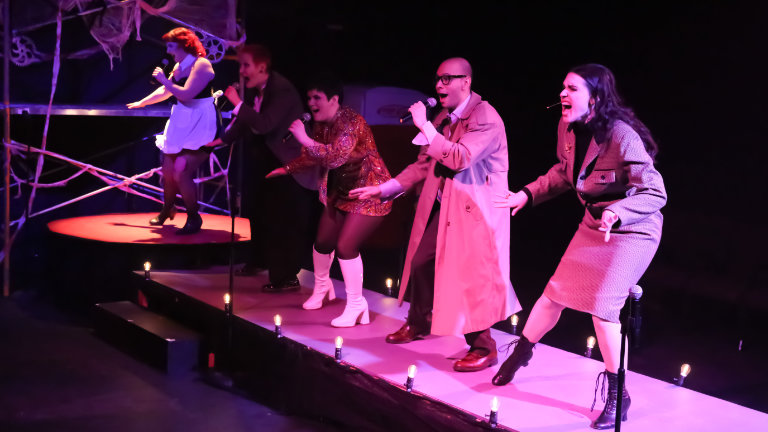
A warning – this version is non-participatory, so no singing along, shouting out or tossing objects, so leave your toast, rice, toilet paper, noisemakers, and other props at home.
Signs placed around The Marcelle remind everyone to enjoy watching the two acts, which last about 1 hour, 45 minutes, and if opening night is an indication, with a spirited crowd. You can, however, dress in costume.
For New Line Theatre’s 99th show in 33 years, scenic designer Rob Lippert has created a modest set for maximum movement, with a runway allowing ample flexibility for the characters to cavort, and scaffolding acting like floors of the castle. An old-timey Coca-Cola cooler becomes a de facto lab.
Costume designer Erin Goodenough has outfitted everyone in what would be considered eccentric standard looks for Rocky Horror, including many pairs of fishnet stockings. A surprising number of sequins went into sparkly attire for character transformations in the finale.
These days, a rebel yell is good for the soul, as more conservative views sweep the land, wishing life were a ‘50s sitcom dream. Anyone not wanting to conform to outdated social mores and go back, those who can take a joke, could get fired up at “The Rocky Horror Show.” Just saying.
New Line Theatre presents “The Rocky Horror Show” from Feb. 27 to March 22, on Thursdays, Fridays and Saturdays at 8 p.m. at the Marcelle Theatre, 3310 Samuel Shepard Drive, three blocks east of Grand. The show has adult themes and is for mature audiences only. For more information: www.newlinetheatre.com.
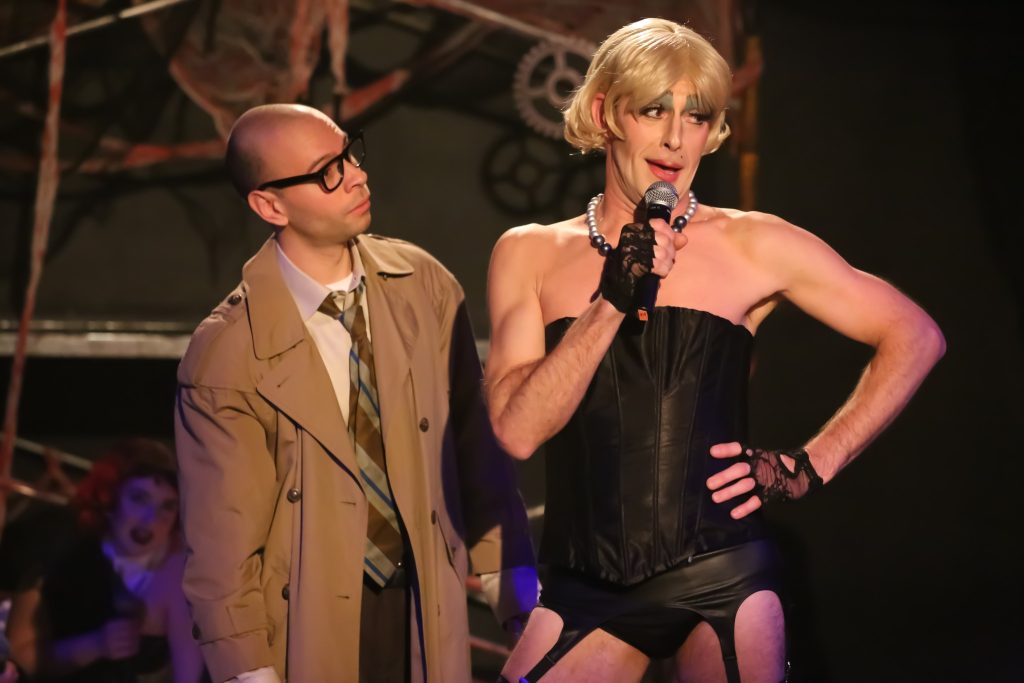

Lynn (Zipfel) Venhaus has had a continuous byline in St. Louis metro region publications since 1978. She writes features and news for Belleville News-Democrat and contributes to St. Louis magazine and other publications.
She is a Rotten Tomatoes-approved film critic, currently reviews films for Webster-Kirkwood Times and KTRS Radio, covers entertainment for PopLifeSTL.com and co-hosts podcast PopLifeSTL.com…Presents.
She is a member of Critics Choice Association, where she serves on the women’s and marketing committees; Alliance of Women Film Journalists; and on the board of the St. Louis Film Critics Association. She is a founding and board member of the St. Louis Theater Circle.
She is retired from teaching journalism/media as an adjunct college instructor.

